
Valentine


Valentine
The award is given annually to one SEC faculty member whose record of teaching and research places him or her among the elite in higher education. Winners are selected by the SEC provosts from among the 14 SEC Faculty Achievement Award recipients.
Jenna Jambeck, Georgia Athletic Association Distinguished Professor of Environmental Engineering at the University of Georgia, has been named the 2024 SEC Professor of the Year for her work investigating the global scale of plastic pollution and galvanizing efforts to address solid waste and marine debris.
Jambeck is a Regents’ Professor of Environmental Engineering in UGA’s
Read
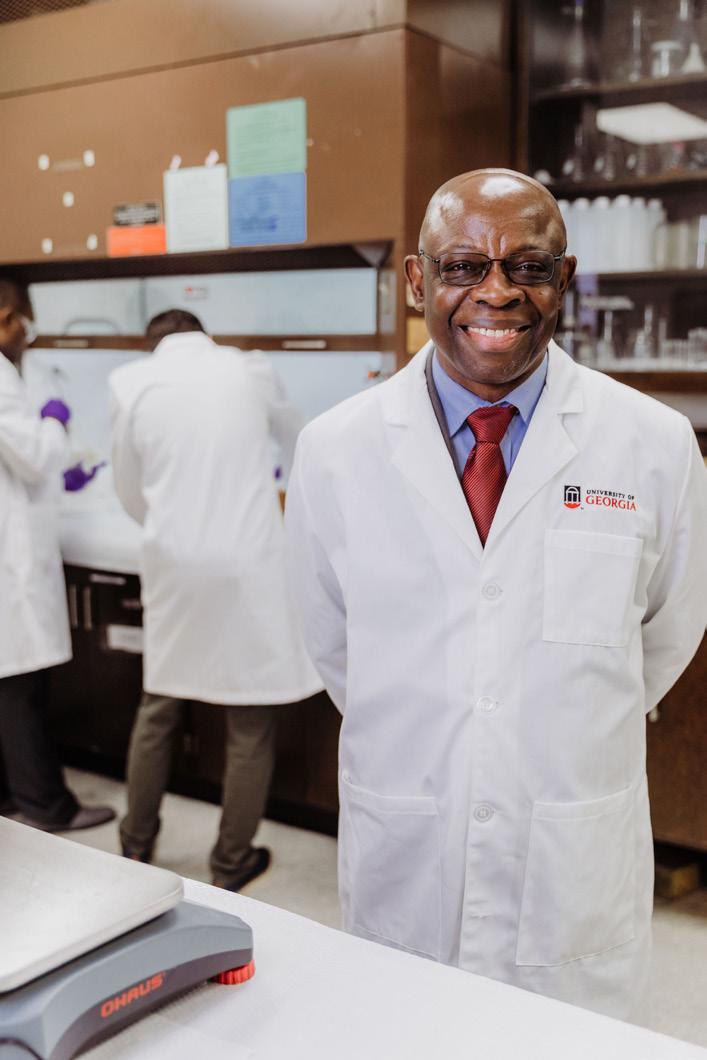
College of Engineering, founder of the Circularity Informatics Lab in UGA’s New Materials Institute and serves as a National Geographic Explorer. A renowned expert in her field, Jambeck has conducted public environ mental diplomacy as an International Informational Speaker for the U.S. Department of State since 2017. work is supported by a diverse set of
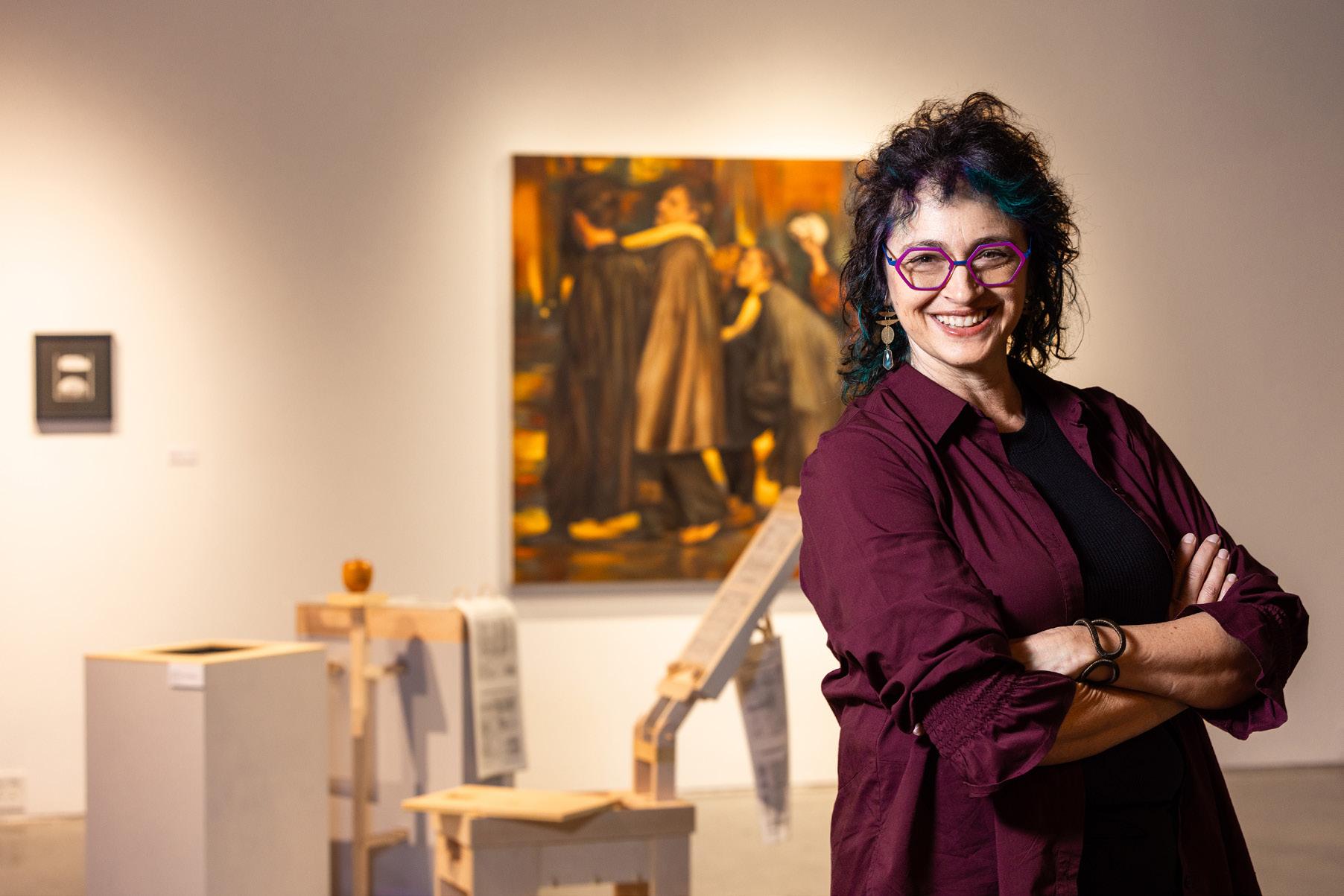
Six faculty members were named Meigs Distinguished Teaching Professors. The professorship is the university’s highest recogniti at the undergraduate and graduate levels. Meigs Professors receive a permanent salary increase of $6,000 and a one-year discret
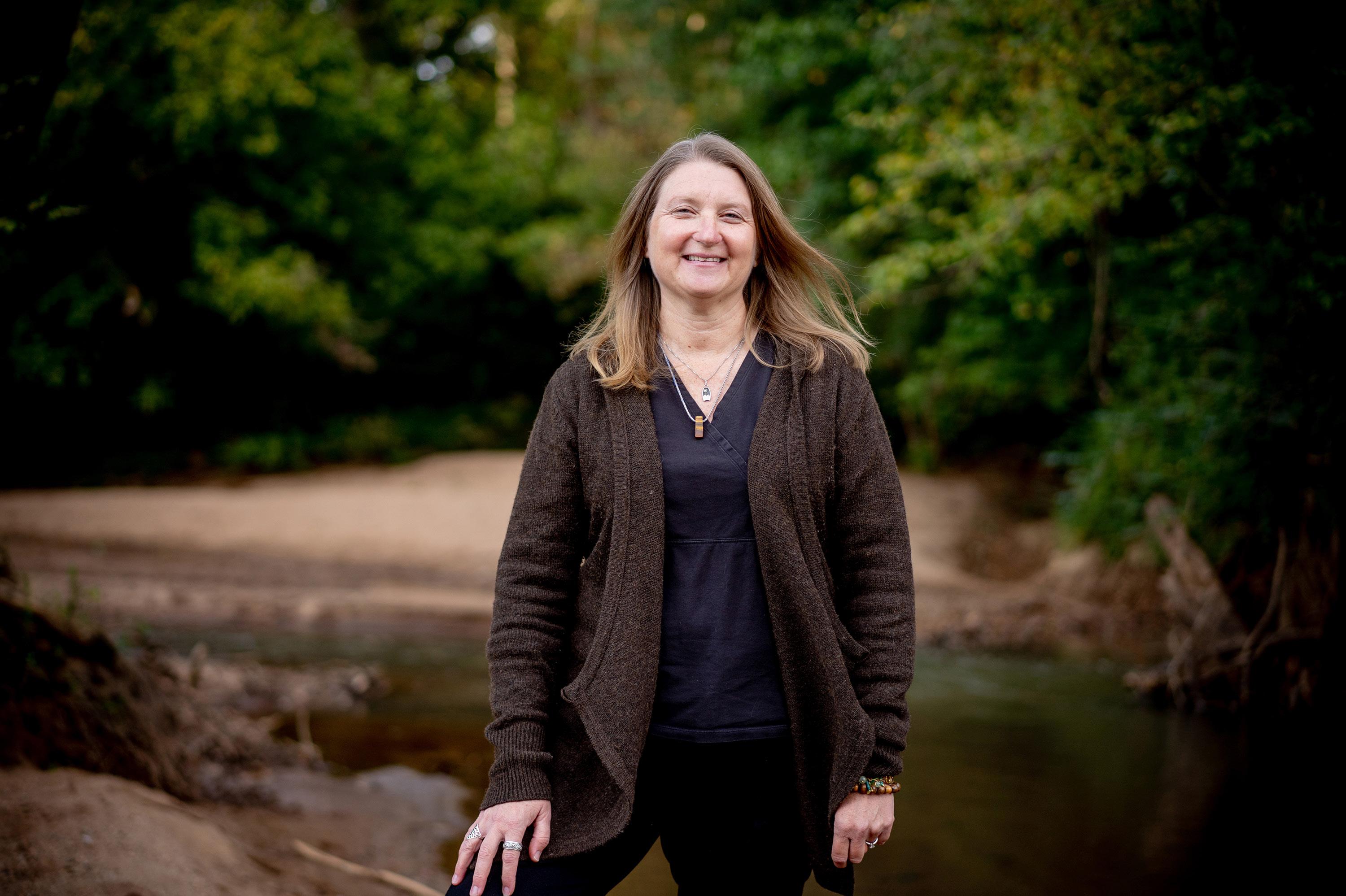
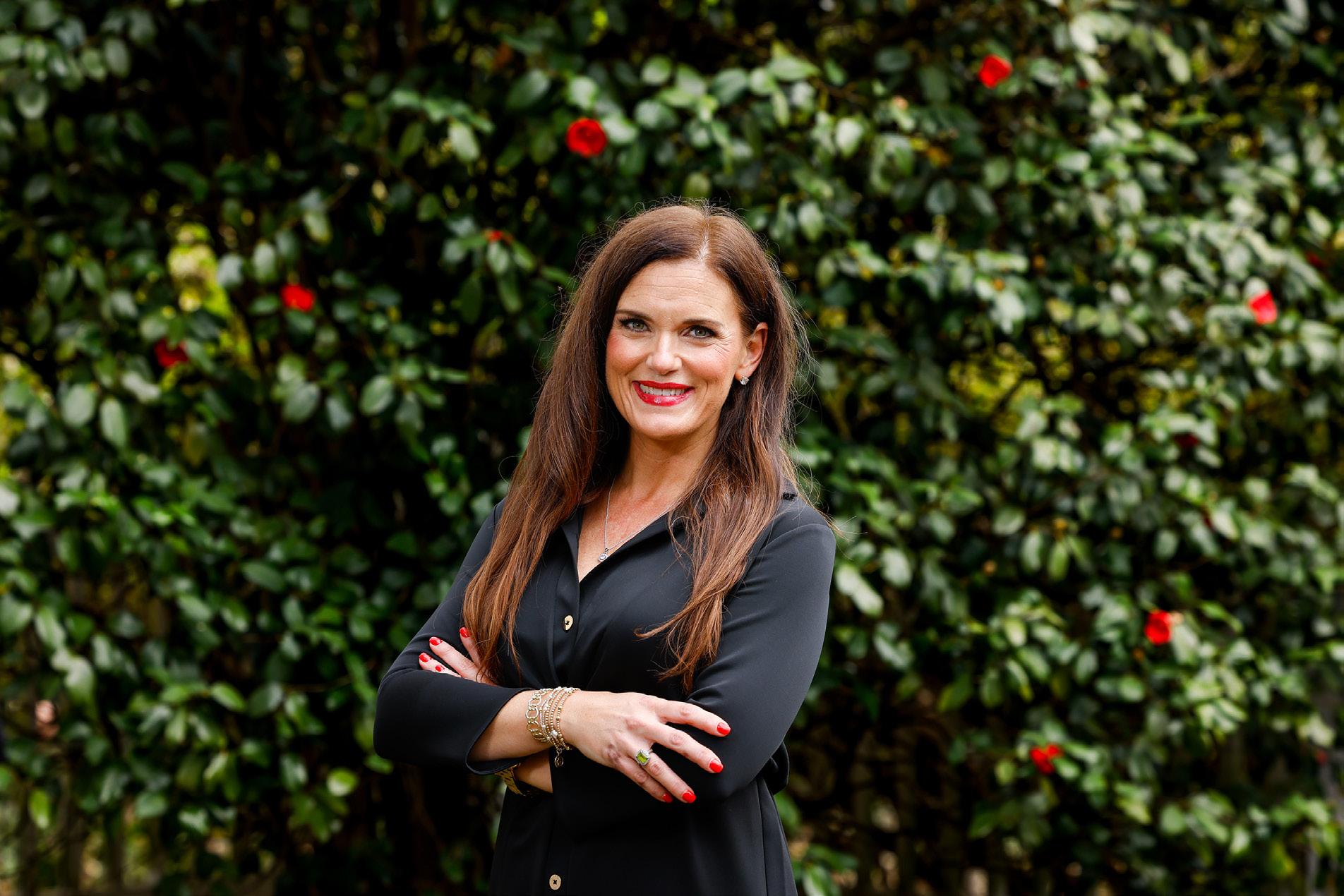
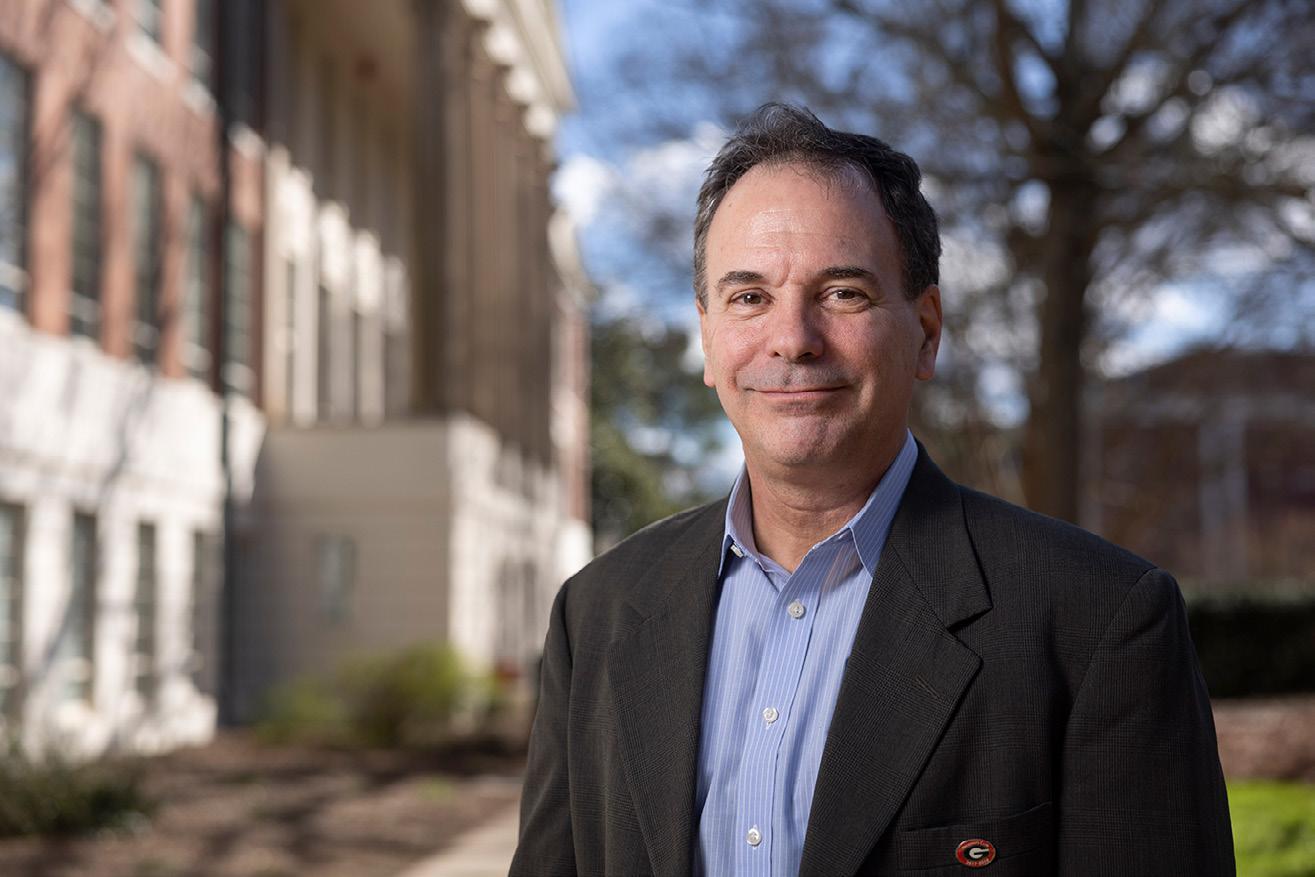
Keith Dougherty strives to continually motivate students, inspire them to work collectively, and get them excited about class.
As an example, he allows students to work together on homeworks that he then reinforces by working through problems in class. He intentionally pairs students with a good
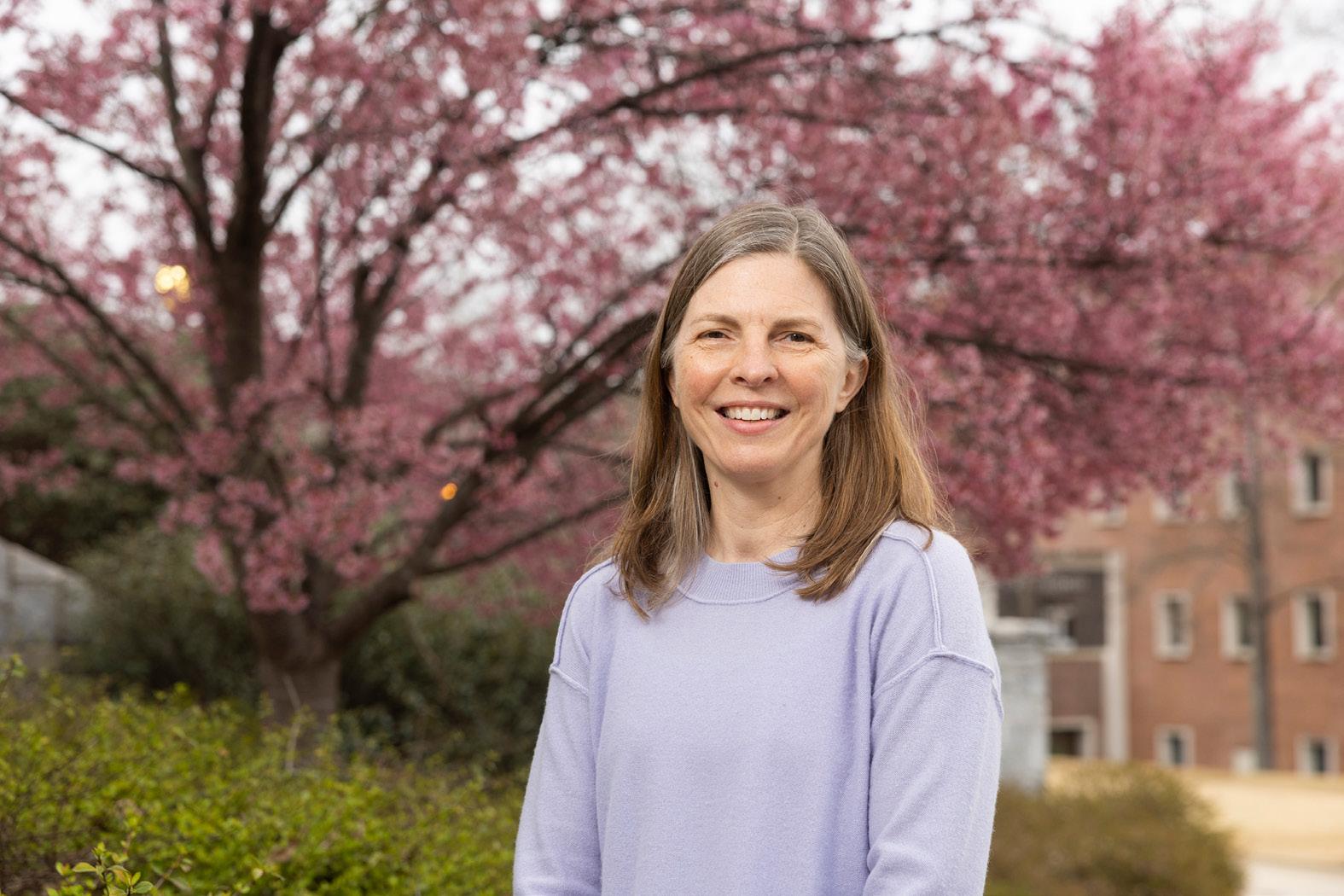
around her and has a never-ending desire to better herself
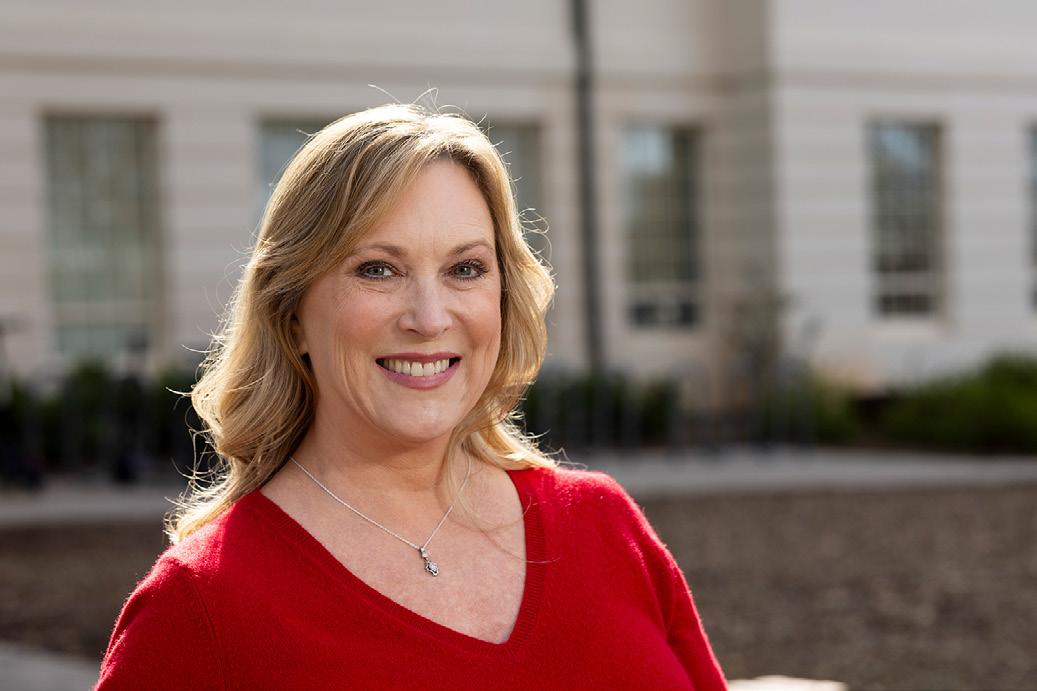
Professor
Department of Sociology
Franklin College of Arts and Sciences
Erin Dolan
Georgia Athletic Association
Professor of Innovative Science Education
Department of Biochemistry and Molecular Biology Franklin College of Arts and Sciences prioritizes students learning science by thinking scientifically, making scientific careers attainable via research mentoring and scaling access to research opportunities via Dolan sits on the university’s Active Learning Advisory
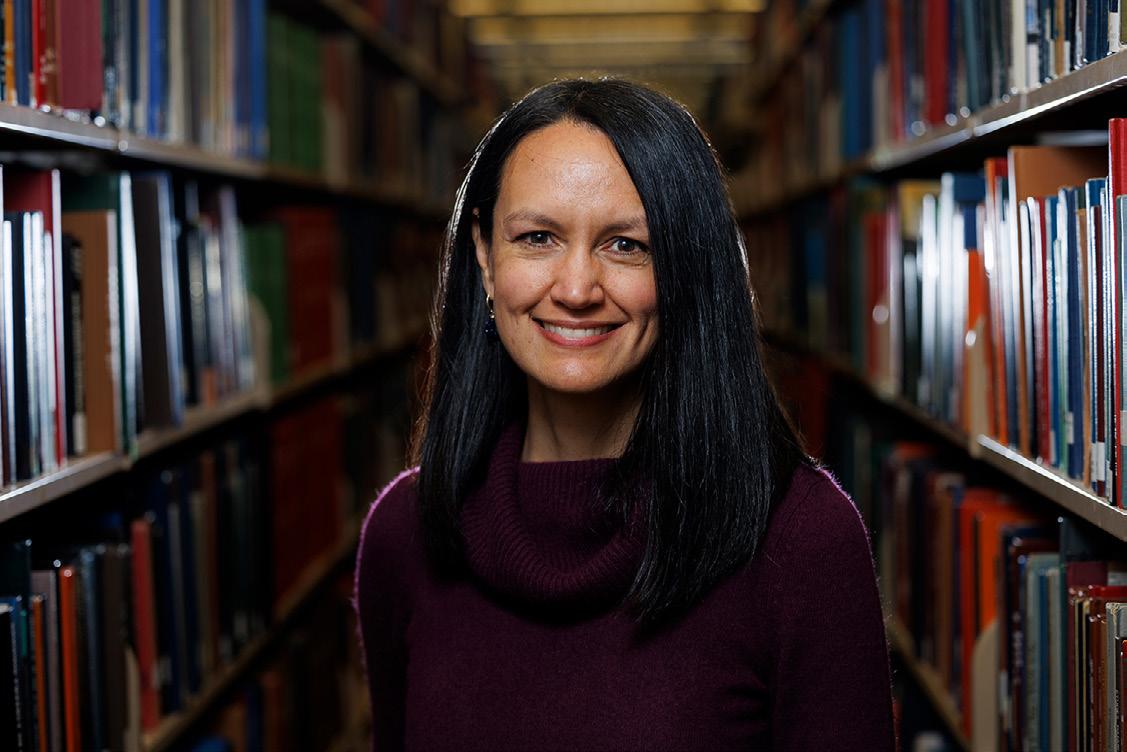
Leslie Gordon Simons takes a dynamic approach to teaching.
Her goal is to guide her students through the learning process. In fact, she encourages her students to focus less on grades and more on learning.
To do that, Simons seeks out innovative teaching strategies.
Department of Cellular Biology
Franklin College of Arts and Sciences
Julie Stanton learned so much from her own outstanding teachers, but perhaps the most important lesson was to be herself in the classroom.
Stanton helps her students become better learners by fostering their love of learning. Her focus is on biology education research. She looks at how students plan,
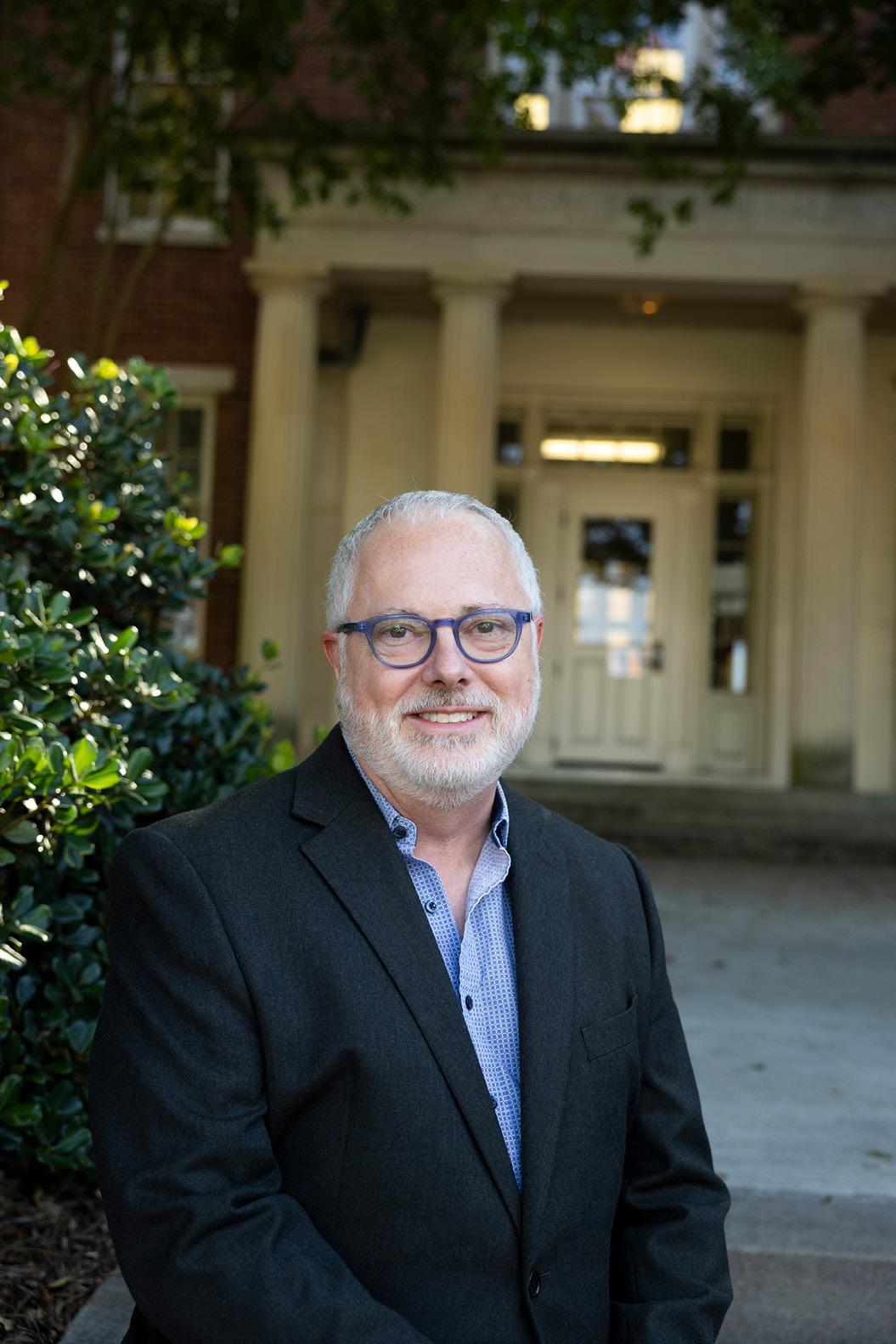
University Professors receive a permanent salary increase of $10,000 and yearly academic support of $5,000.
Nominations from the deans of UGA’s schools and colleges are reviewed by a committee, which makes a recommendation to the provost.
Keith Langston
Professor
Department of German and Slavic Studies
Department of Linguistics
Franklin College of Arts and Sciences
During the nearly 30 years that has been a member of UGA’s faculty, he has seen and had a hand in the expansion of language studies at the university. In that time, he has served as head of the Department of German and Slavic Studies and the Department of Linguistics and led the creation of the Russian language major.
“Through these and many other contributions, Dr. Langston has made a lasting impact on students and colleagues at the University of Georgia,” said Anna Stenport, dean of the Franklin College of Arts and Sciences.
Langston led the establishment of the linguistics department in 2017 and became its first head—a position he currently holds and has been reelected to twice. Additionally, he served as Russian language program coordinator from 1995 to 2017, revising and reorganizing the
Through the years, Langston has also continued work on his own research. He has
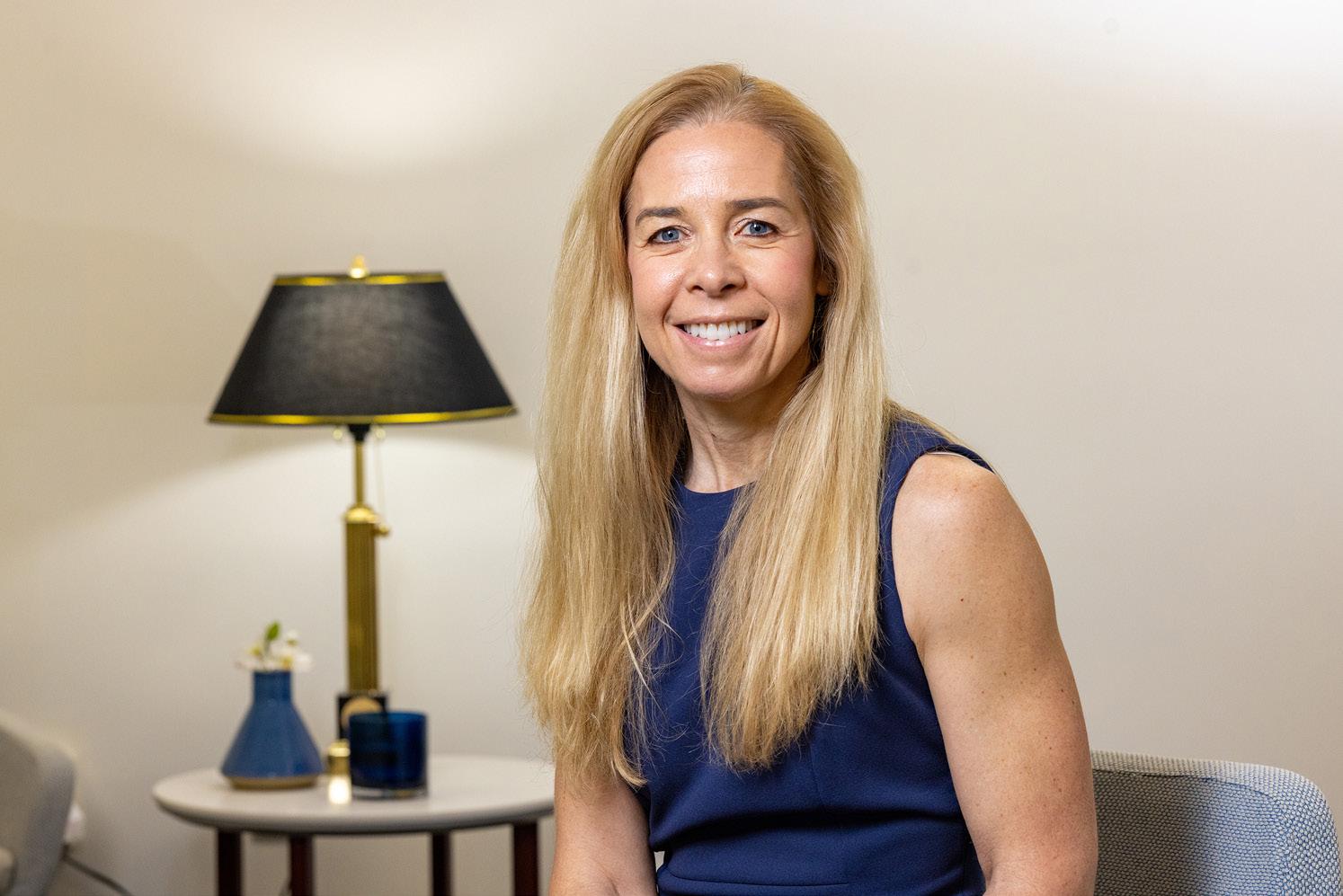
Paula Lemons
Professor
Department of Biochemistry and Molecular Biology
Associate Dean
Franklin College of Arts and Sciences
considers herself a change agent in academic leadership, policy development, innovative programs and teaching.
“We have all served with her in the Franklin College Dean’s Office and seen firsthand the impact she is having on the university, particularly in the areas of graduate education, science collaboration, and education and teaching assessment,” said Anna Stenport, dean of the Franklin College of
An example of her academic leadership is her founding and seven-year executive directorship of the Scientists Engaged in Education Research (SEER) Center, which includes nearly 50 faculty who conduct STEM education research and/or utilize its outcomes in their teaching.
As part of the SEER Center’s National Science Foundation grant for the DeLTA project, Lemons led colleagues to collaborate with members of the university administration and
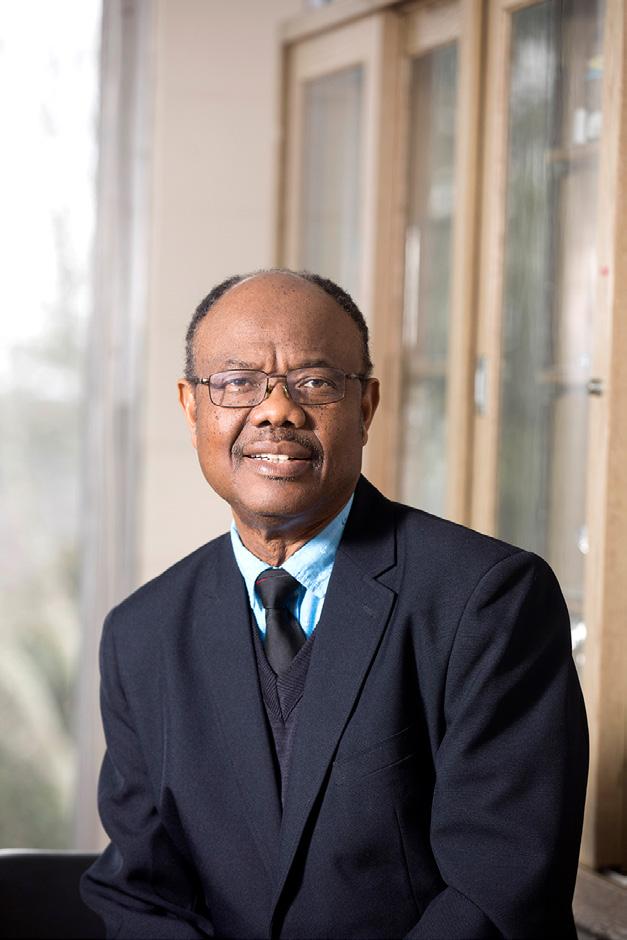
The title of Distinguished Research Professor recognizes senior faculty members who are internationally recognized for their innovative body of work and its transformational impact on the field. The Professorship is awarded to individuals working at the very top of their discipline, who are recognized as preeminent leaders in their fields of study.
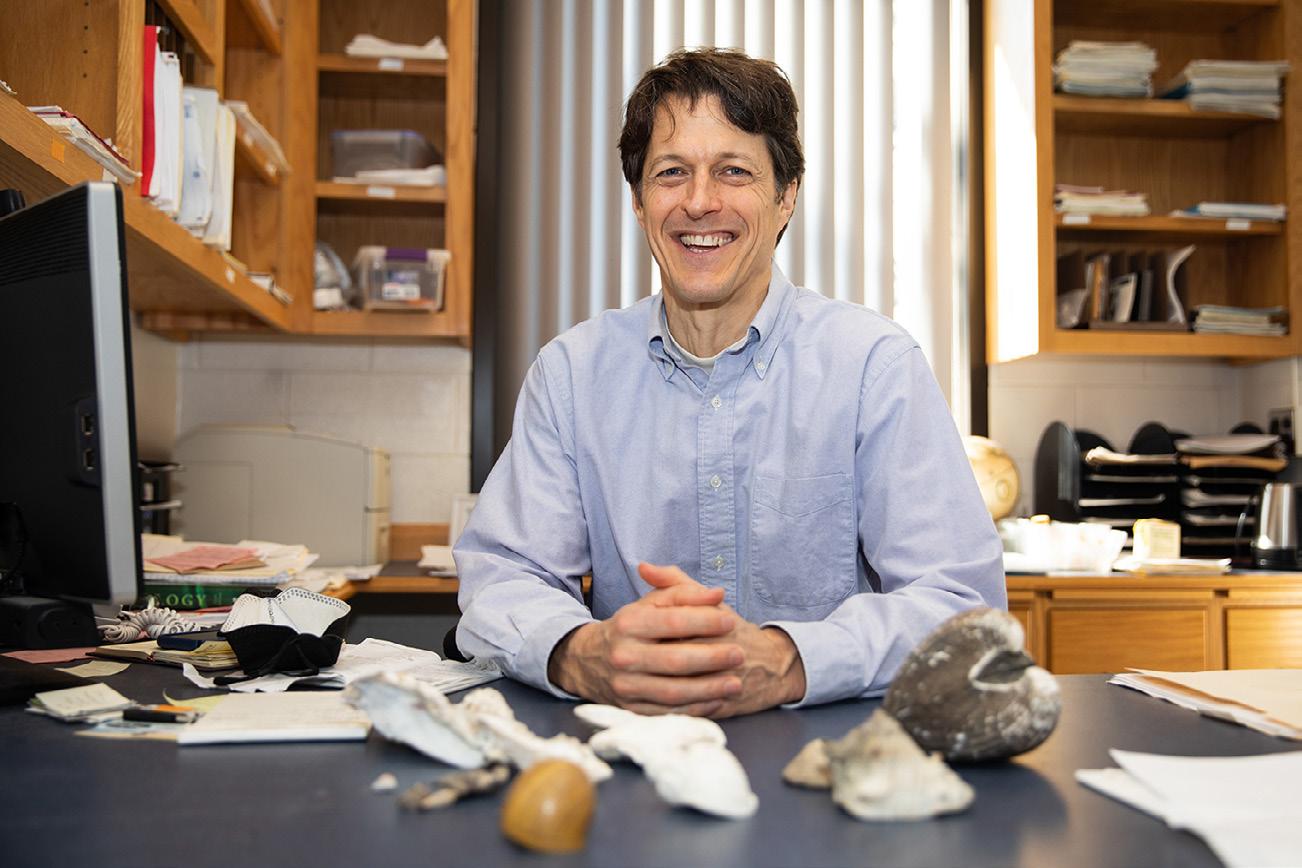
and Environmental Sciences’ poultry science department, is a global leader in developing and applying emerging technologies of quantitative genetics, molecular biology and bioinformatics to critical issues in the poultry industry. His research interests include genome selection, genomics of nutrient utilization, molecular and cellular bases of stressors, and genetic improvement of poultry. He has made advances in understanding linkages among nutrient components, parasite load and genetics that affect birds’ microbiome and gut health. As part of an international consortium, he helped identify and map 14,000 genes associated with growth and development in poultry, which aid breeders in producing more disease-resistant, feed-efficient and heat-tolerant birds. He has also improved understanding of pressures on poultry production, such as water intake and heat stress.
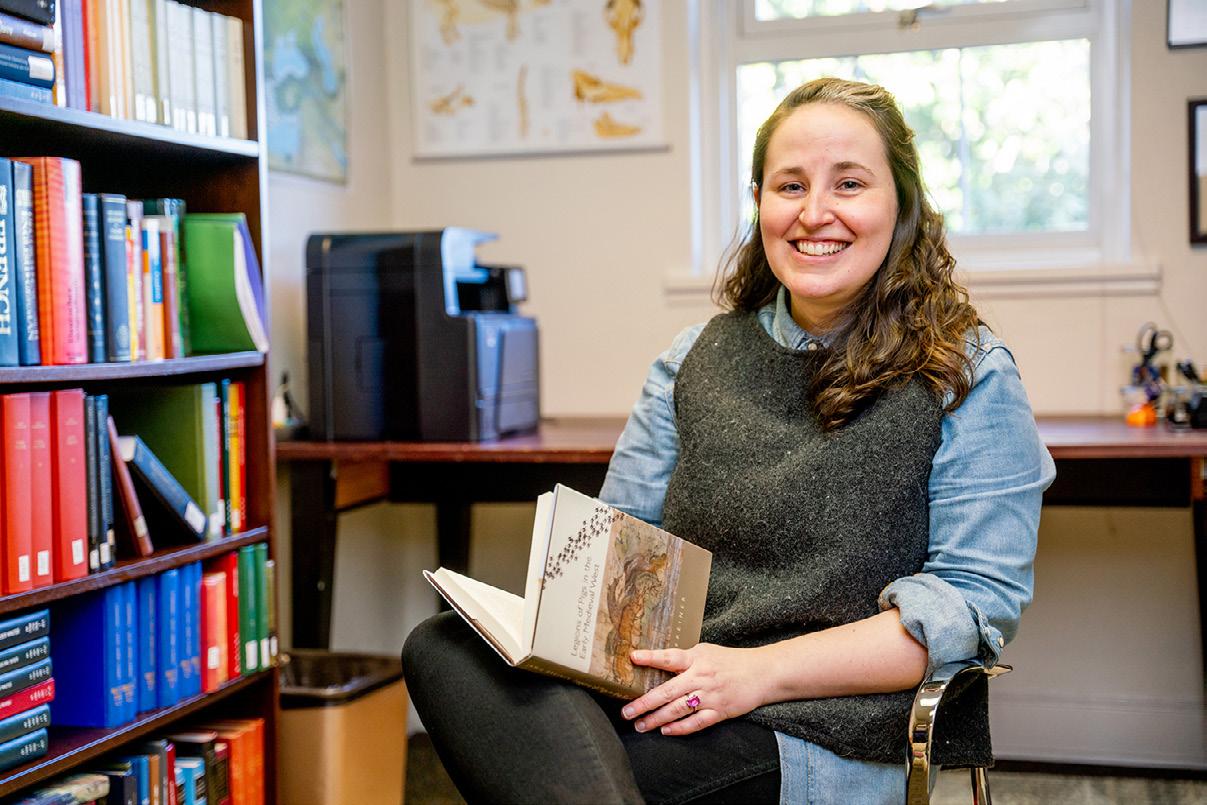
He is best known for his research quantifying and predicting the success of biological invasions. Byers has performed some of the world’s leading ecological studies on interactions among native organisms and nonnative species. He has built mechanistic mathematical models to analyze the impacts of climate change, including expansions of invasive parasites and subtropical species into the state’s marine and freshwater resources. His approach combines experimental work and fieldwork at local, regional and continent-wide scales with computational models, providing critical theoretical insights. His body of research has been cited more than 16,500 times, with 17 papers exceeding 200 citations each.
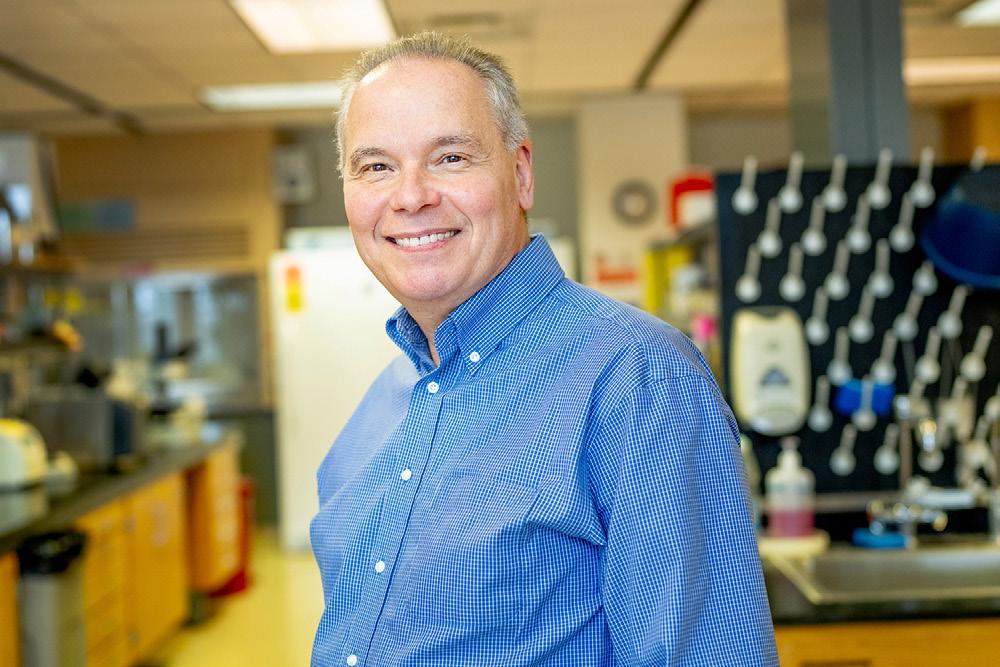
in the early Middle Ages (400 to 800 CE). Her research asks how and why cultures changed in societies that remade themselves as the Roman Empire fractured. She questions how ideas and norms—about good government, wealth or nature, for example—were intertwined with different forms of power and influence and attempts to discover how early medieval communities themselves wrestled with those dynamics. These questions have guided her research. Most recently, her book, “The Wandering Mind: What Medieval Monks Tell Us About Distraction” (Liveright, 2023), tracks early Christian monks’ frustrations with distraction and their inventive and sometimes contentious efforts to make themselves concentrate—and it shows how their moralization of the problem foreshadowed a current age of distraction.
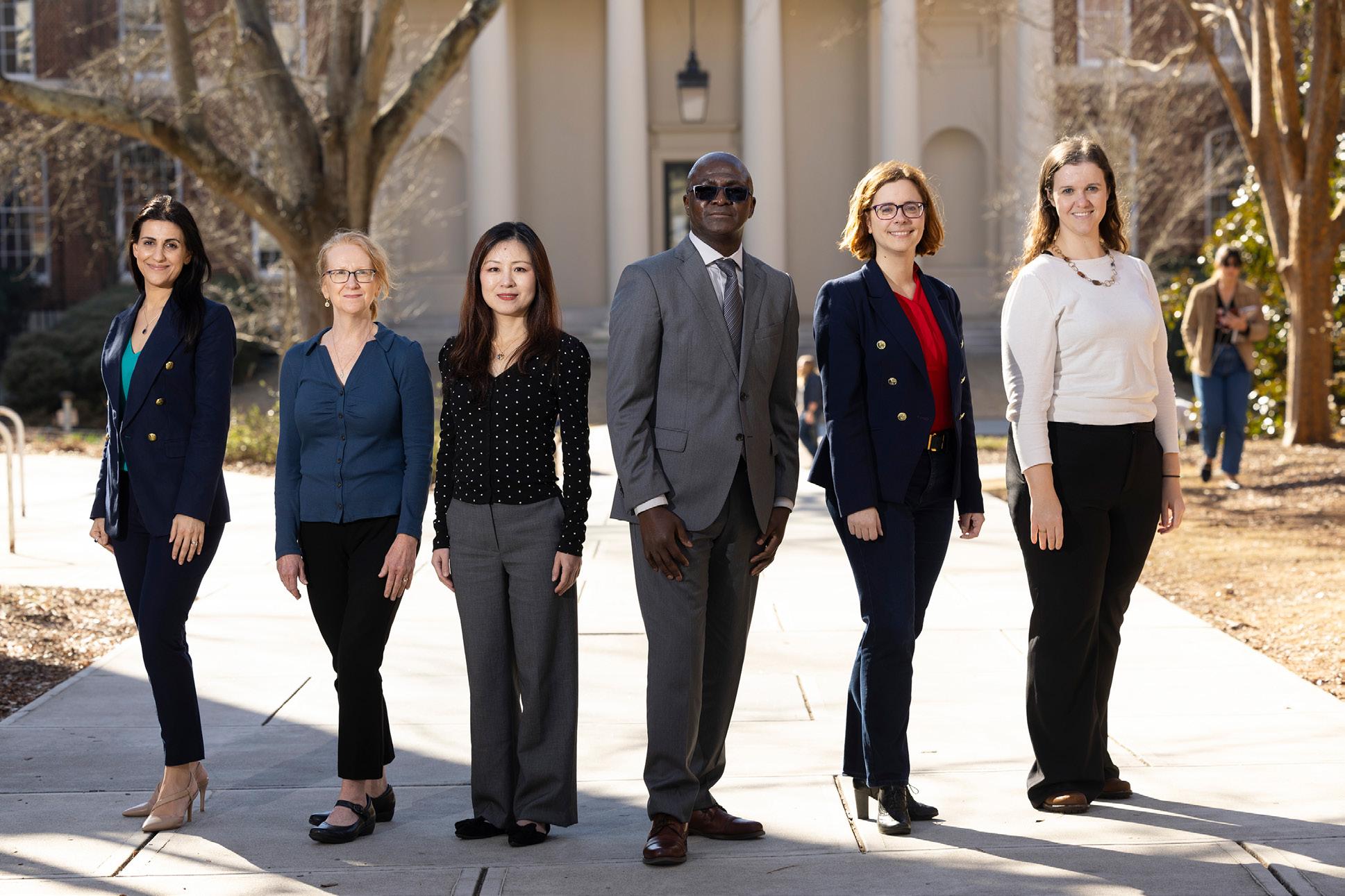
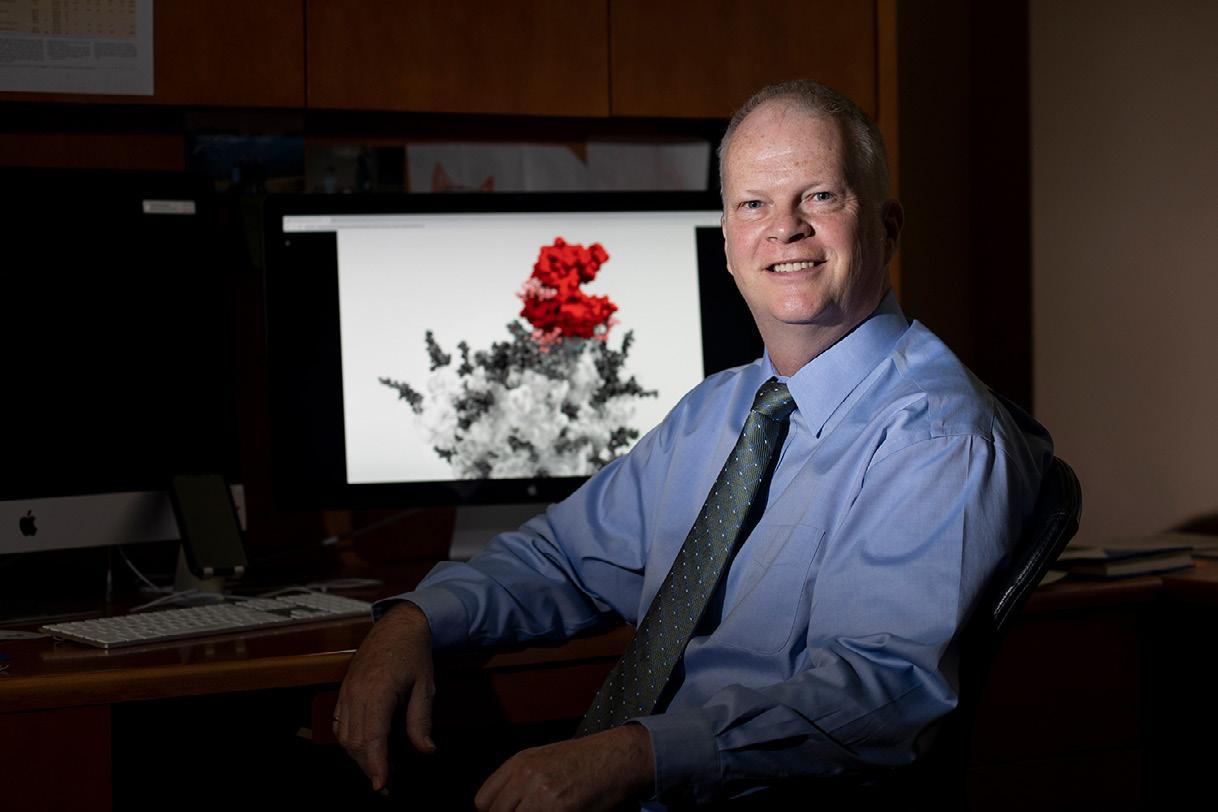
photo
Department of Microbiology in the Franklin College of Arts and Sciences, is a world leader in the genetics, molecular biology and virulence mechanisms of pathogenic fungi— particularly Candida albicans, the most prevalent fungal pathogen in humans. Contributing to a greater understanding of biology and infectious diseases, he has enabled modern molecular biological studies of C. albicans, using genetic and genomic tools to explore fungal pathogenesis and drug resistance. His discoveries include a greater understanding of the genetic basis for biofilm formation, which can render microbial pathogens resistant to antimicrobial agents and even physical removal. These advances on fungal biofilms are paradigm shifting. His group’s recent research, drawing on advances in omics, reveals natural variations in the genetic regulation of biofilms and the core network that might be targeted for antifungal therapy.
Robert J. Woods, professor in the Department of Biochemistry and Molecular Biology in the Franklin College of Arts and Sciences and the Complex Carbohydrate Research Center, has received recognition for his innovative research in glycoscience—the chemical biology and biomedical impact of complex carbohydrates (glycans) covering surfaces of cells and viruses. His work applies expertise in molecular structures and computational modeling to understand glycan structure and function. By integrating experimental data with molecular dynamics calculations, Woods has illustrated that the space occupied by glycans in both the HIV envelope protein and SARS-CoV-2 spike protein modulates immune recognition and can help guide vaccine design. He developed a web environment for building complex glycans that allows users to computationally explore the molecular dynamics of glycans and their interactions with other biomolecules.
The Center on Human Trafficking Research & Outreach (CenHTRO) is an interdisciplinary effort based at the UGA School of Social Work, comprising faculty, staff and students on three continents and operating in 10 countries. The center, formally established in 2021, has built a global community of humantrafficking scholars, an unprecedented achievement in this field. Garnering $30 million in funding, CenHTRO supports rigorous and innovative trafficking studies incorporating the expertise of faculty in economics, international affairs, law, political science, public health, social work, sociology and statistics. Center researchers collaborate with multiple arms of the United Nations to encourage evidence-based interventions to prevent trafficking, support survivors and strengthen prosecution of traffickers. With the center’s guidance, governments have passed and enforced anti-trafficking laws and helped NGOs and nonprofits remove victims from slavery-like conditions. CenHTRO has trained almost 4,000 individuals—including judiciary members, law enforcement, social workers, educators, students and community groups—to improve local action against human trafficking.
Andrew Davis Tucker Dorothy Kozlowski Submitted Andrew Davis Tucker Aaron Mitchell, professor and head of the Chamberlain Smith Jason Thrasher See LANGSTON on page 8 See LEMONS on page 8 Shown, from left, are Lydia Aletraris, Jody Clay-Warner, Hui Yi, David Okech, Laura Zimmermann and Claire Bolton.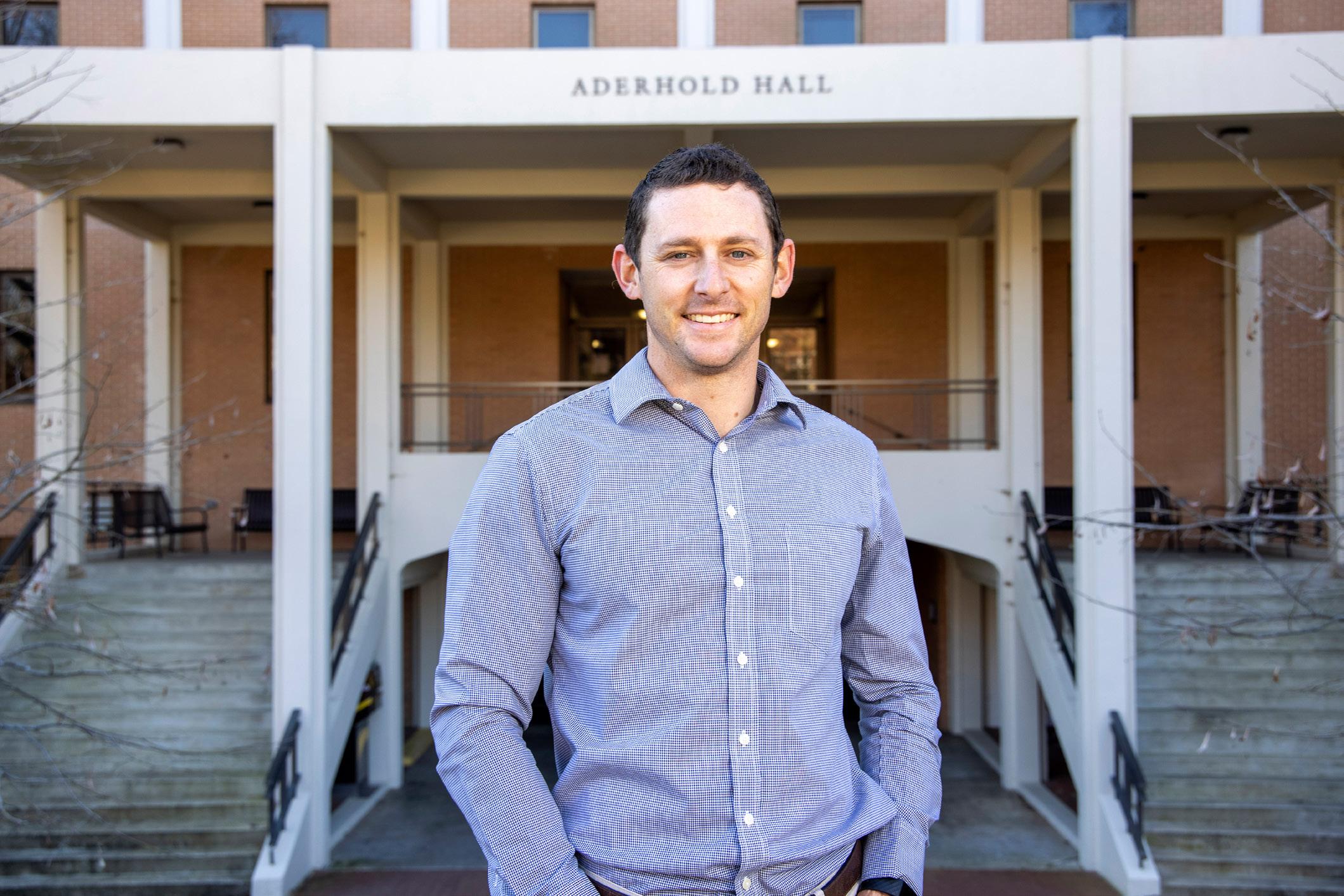
ing. Fiorella’s work fills several gaps in prior research by specifying the unique and complementary cognitive functions of distinct modes of generative sense-making—explaining, visualizing and enacting—and by providing practical recommendations for implementing appropriate instructional methods and learning activities. His work demonstrates
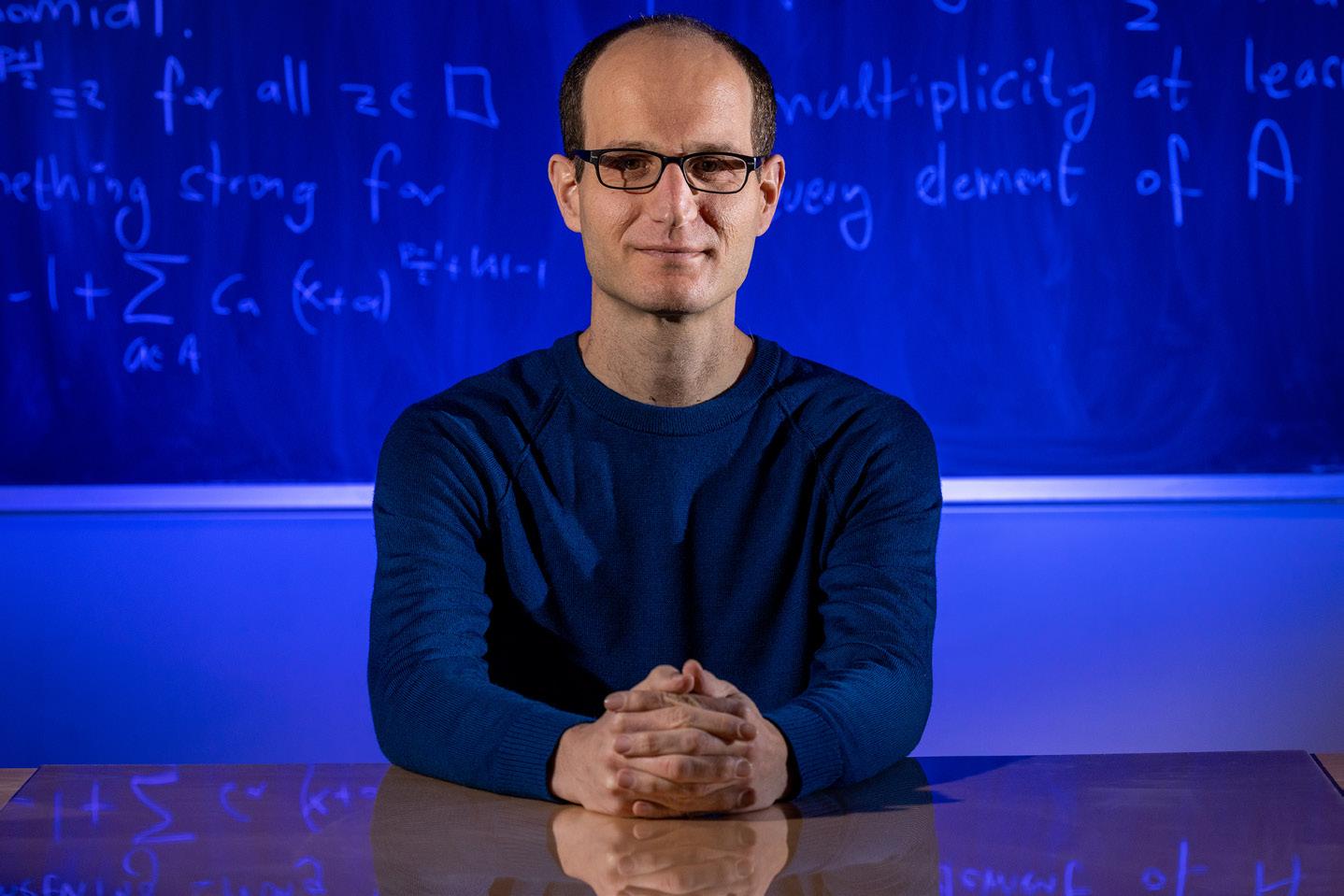
mimicking the human physiology of NO production to make medical devices hemocompatible and antimicrobial. This state-of-the-art coating is now progressing toward commercialization. Handa’s startup, Nytricx Inc., has received more than $3.5 million in funding from a National Institutes of Health Phase II Small Business Innovation Research grant and a Defense Medical Research Development award to expedite the commercialization
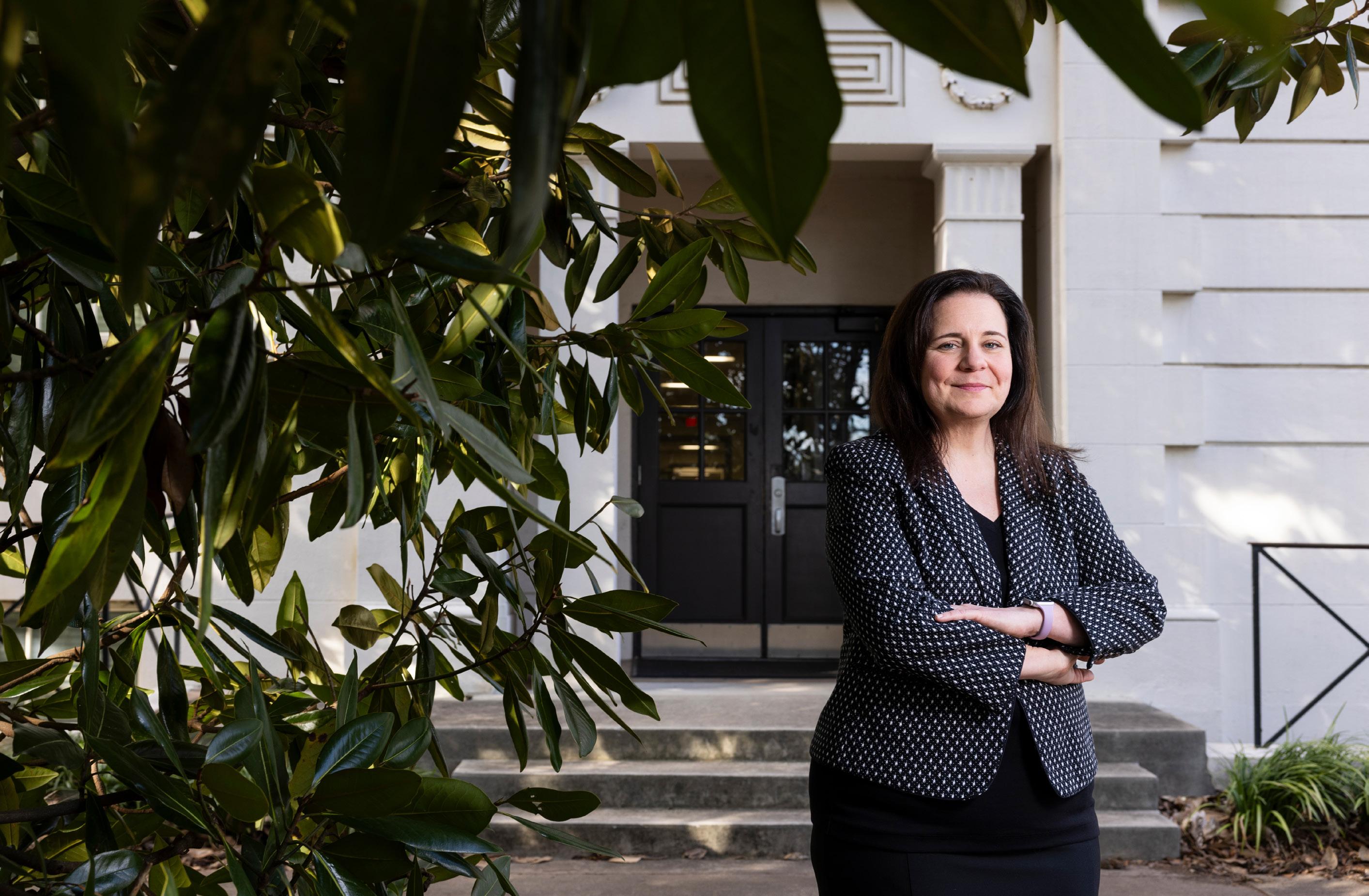
cal Society, the flagship journal of the LMS. The paper deals with a wellknown problem in the structure of Paley graphs, a fundamental model allowing mathematicians to address deep questions with applications in coding theory and cryptography. In an argument that takes slightly more than a page, Petridis and Hanson apply the polynomial method to make progress on a problem many others have tried but failed to crack. The paper attracted the attention of mathematicians because of its surprisingly brief and elegant proof based on a creative and imaginative approach. Petridis has published several other high-impact research papers. His research has been continuously funded by the National Science Foundation since 2015.
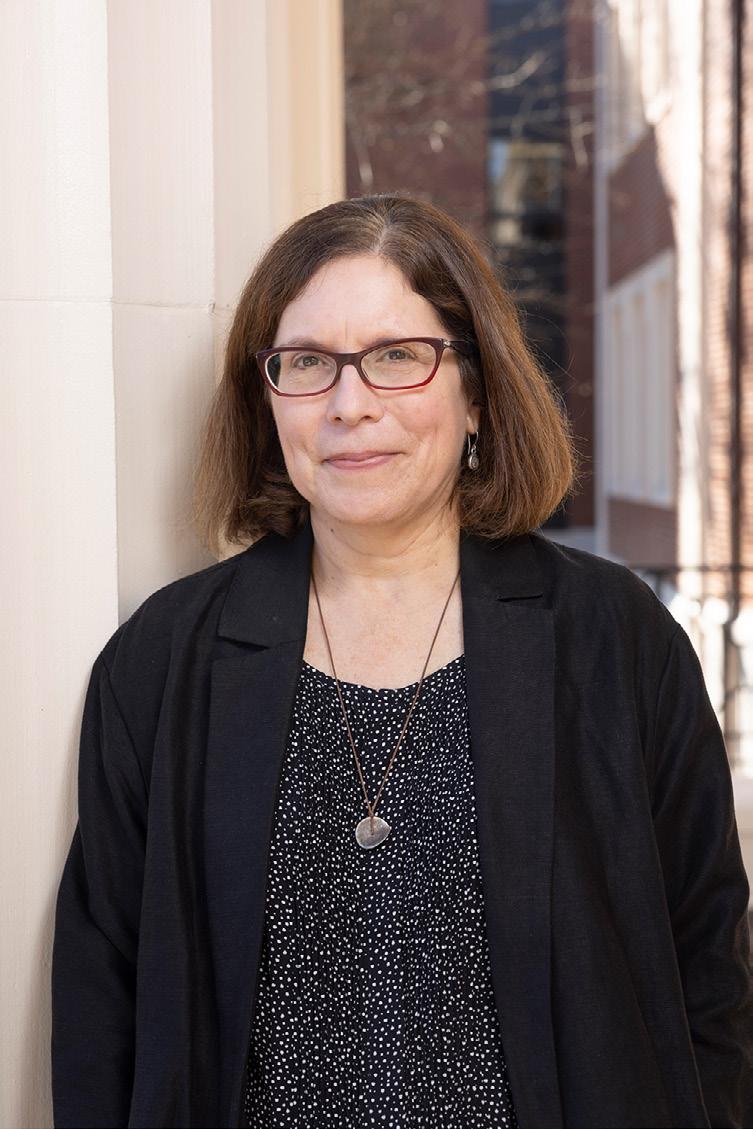
The university established the Creative Research Medals in 1980 to recognize a distinct and exceptional research or creative pr performed by a mid-career faculty member, with extraordinary impact and significance to the field of study.
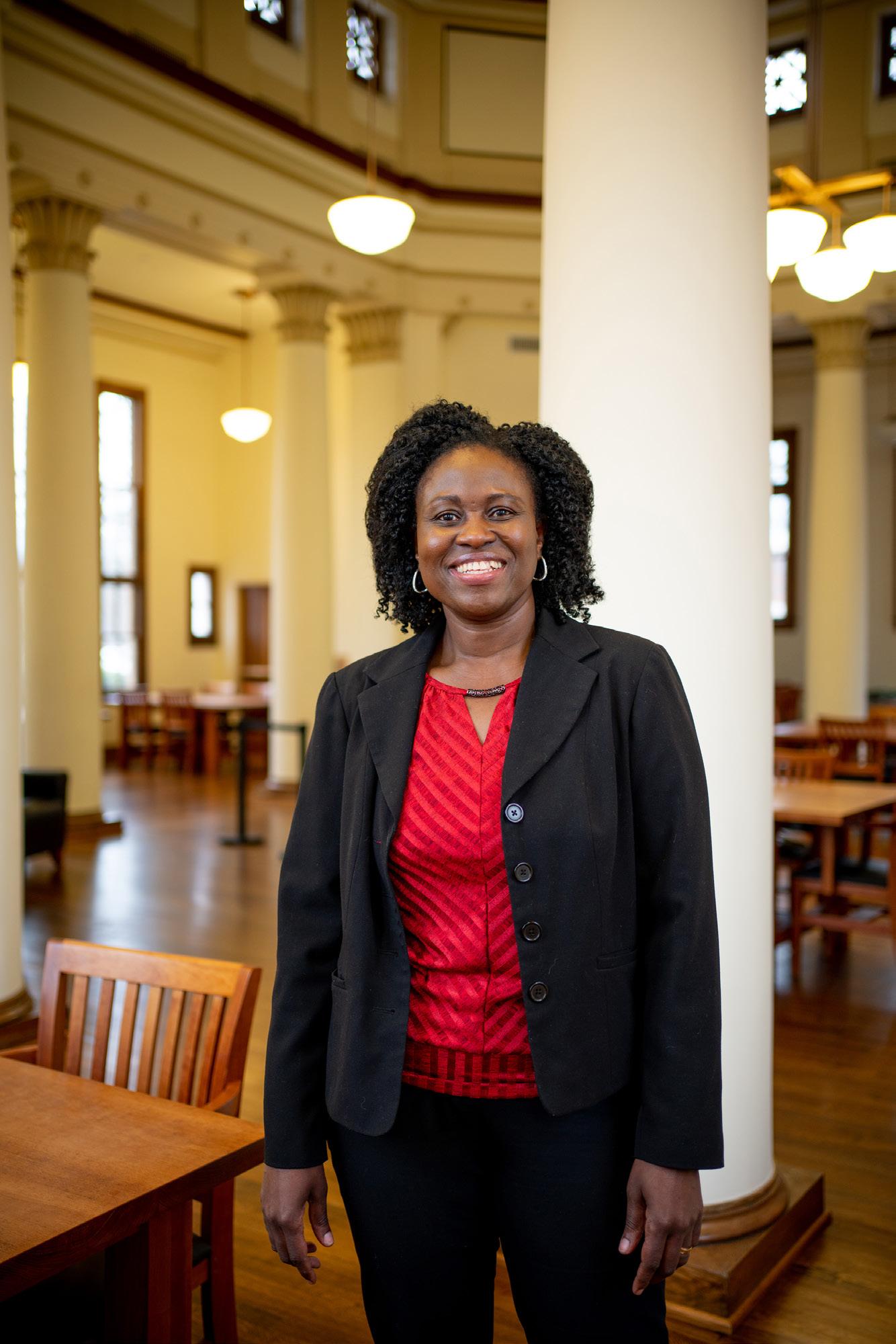
Loy from the margins of modern ist studies into the spotlight, is a scholarly contribution of various approaches, depending on which part of the website is visited. The website offers a scholarly guide to Loy’s career including close read ings of her writing, designs and visual art; edited biographies of Loy and her cohort; a venue for student scholarship featuring digital humanities tools; and an intensive immersion in Loy’s style, writing, life and travels. Combining archival research and creative activity and linking elements of avant-garde design to original scholarship, this initiative has sparked greater interest in modernist women writers and paved a new path for research.
adherence. For patients with drugresistant tuberculosis, VDOT would help ensure adherence to a new oral antibiotic available to treat this disease strain. Sekandi is working with colleagues in the School of Computing to develop novel facial recognition software to read and interpret videos of patients’ adherence with minimal human input.
These awards recognize established investigators whose overall scholarly body of work has had a major impact on the field of study and has established the investigator’s international reputation as a leader in the field.
Court confirmation hearings held before the Senate Judiciary Committee. The authors use extensive new data and qualitative evidence to highlight how female nominees and people of color nominees have faced significantly more challenges during the confirmation process than their white male colleagues, revealing that race and gender bias exists even at the highest echelon of U.S. legal power.
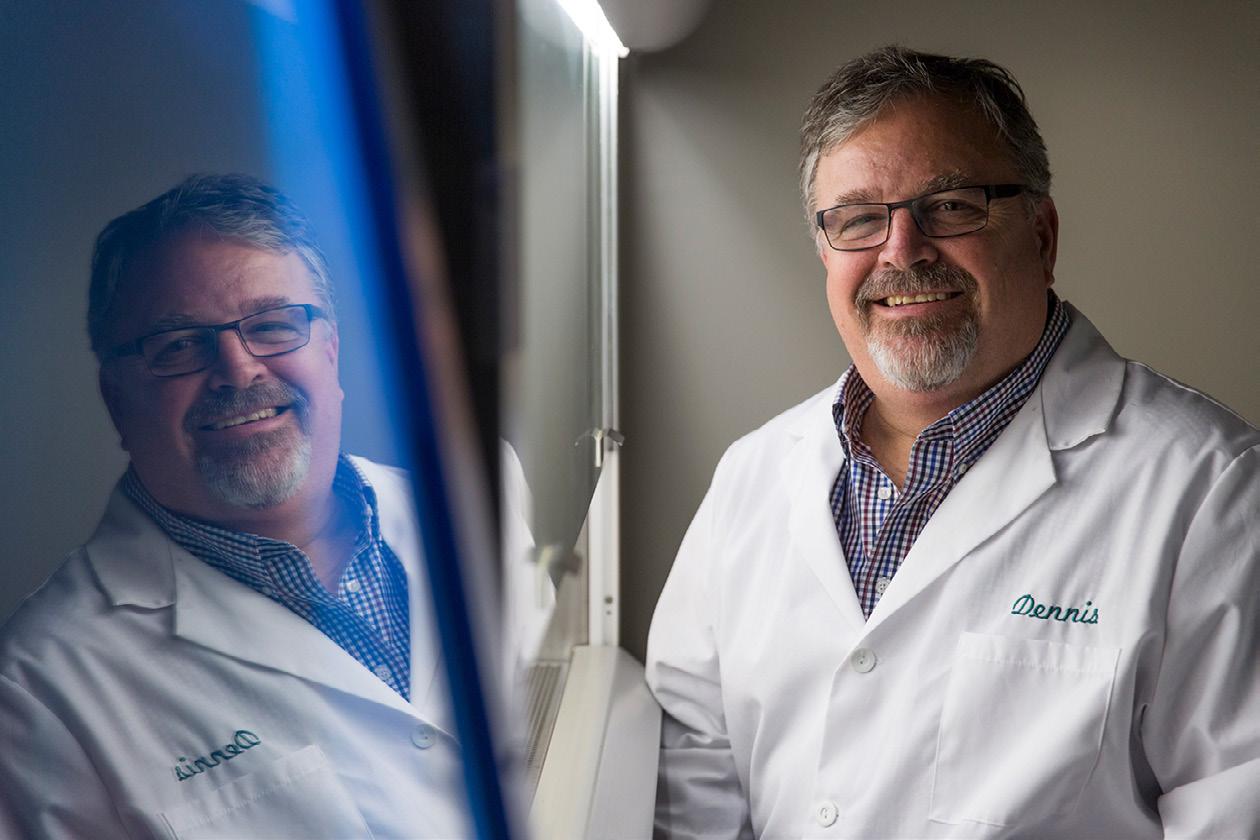

College of Arts and Sciences’ genetics department and former director of the UGA Institute of Bioinformatics, has focused her interdisciplinary career on the question of how parasites evolve. She has been a driving force behind the groundbreaking effort to create and maintain novel bioinformatics databases covering omics data for hundreds of dangerous pathogens. The Eukaryotic Pathogen, Vector, and Host Informatics Resources knowledgebase (VEuPathDB.org) is an integrated, centralized resource for data mining on more than 500 organisms. Databases searches are free, permitting researchers to gain insights into and test hypotheses that may pave the way for new approaches to treating or preventing diseases such as malaria and Cryptosporidium (a waterborne parasite). Kissinger has used the databases and other bioinformatics tools to make remarkable discoveries.
diseases in the Franklin College of Arts and Sciences and the Col lege of Veterinary Medicine, is one of the top parasitologists in the world. Kyle serves as director of the Center for Tropical and Emerging Global Diseases, and some of his most recent work focuses on discovery of new drugs that eliminate dormant vivax malaria that can linger in the liver. His group has discovered new drug series that target the dormant liver stages and is moving these novel therapeutics through preclinical studies. He also works on Naegleria fowleri, a rare but deadly parasite known as “brain-eating amoebae.”
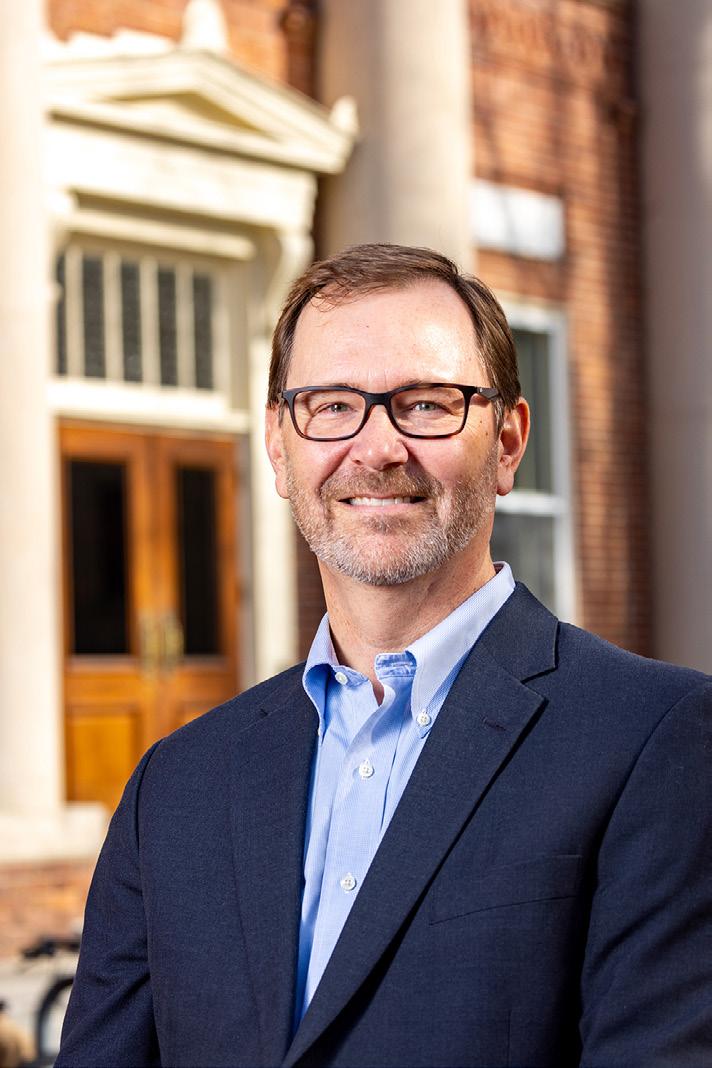
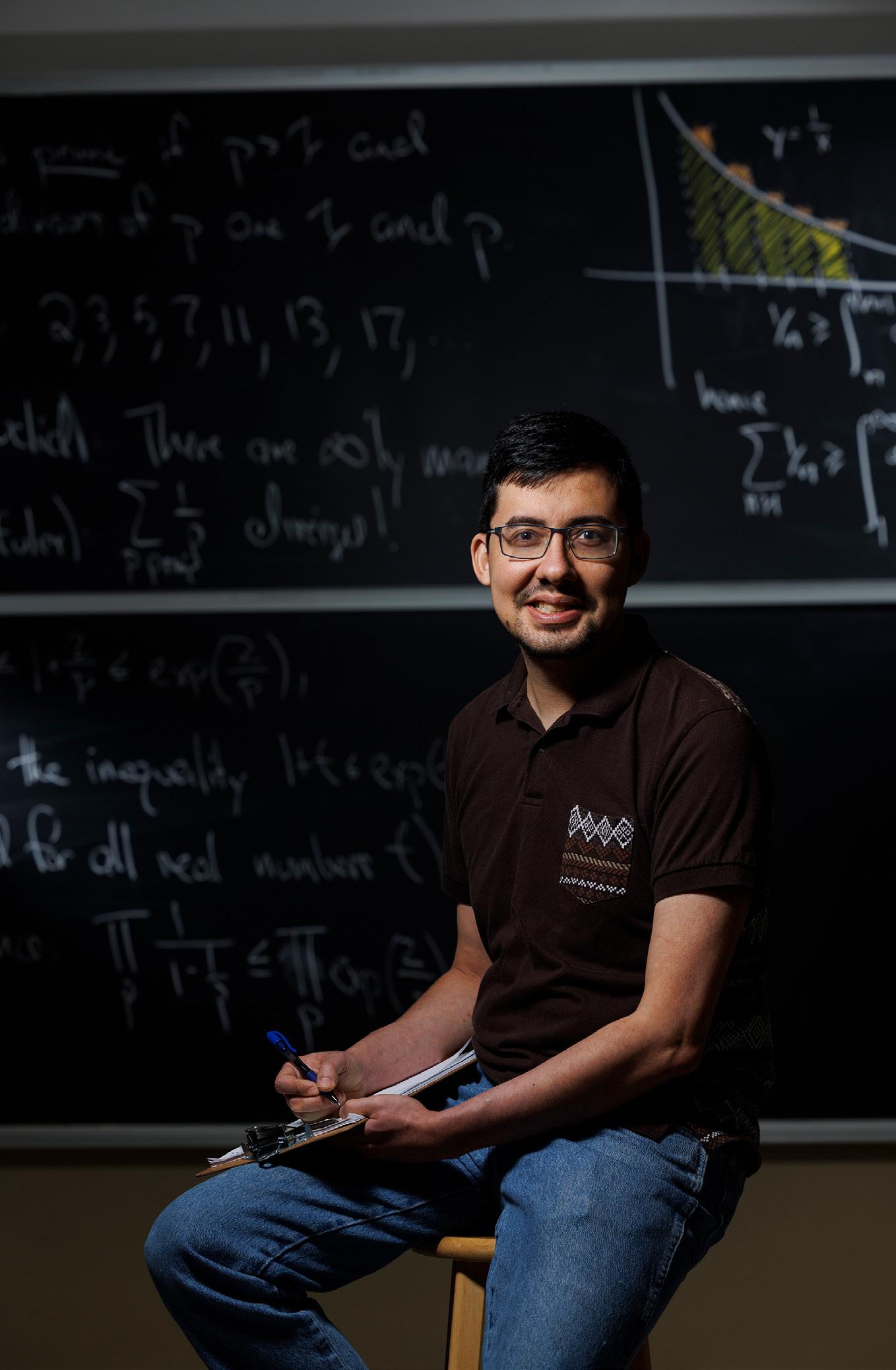
Religion, has played a central role in establishing, advancing and naming a new interdisciplinary sub-field of research: theologically engaged an thropology. A recipient of two major John Templeton Foundation grants, he asserts that theological knowledge can enhance anthropological work on religion, and cultural anthropology can influence theology. His edited book, “Theologically Engaged An thropology” (Oxford University Press, 2018), places the development of theologically engaged anthropol ogy in an intellectual context and offers a roadmap for developing it. arithmetic functions and classifying the torsion of elliptic curves.
More than 97% of people infected with these amoebae die within two weeks. Kyle has conducted research into that pathogen, leading to effective repurposed drugs and the first rapid, sensitive diagnostic method.
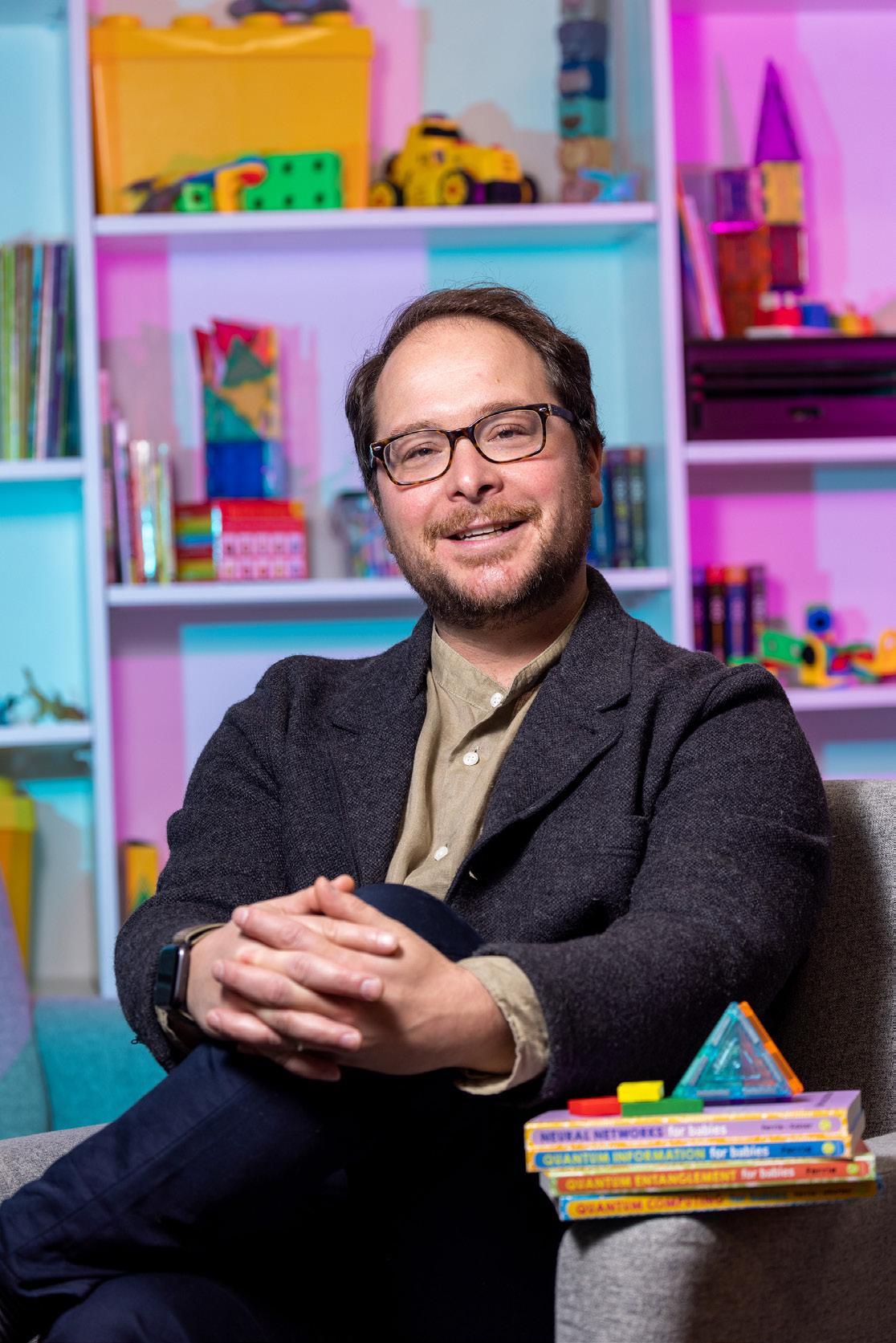
Established by the UGA Research Foundation, these awards recognize junior faculty whose research, creative and scholarly achievements indicate a trajectory toward an exceptional, sustained research career and an imminent rise to international stature in their field of study.
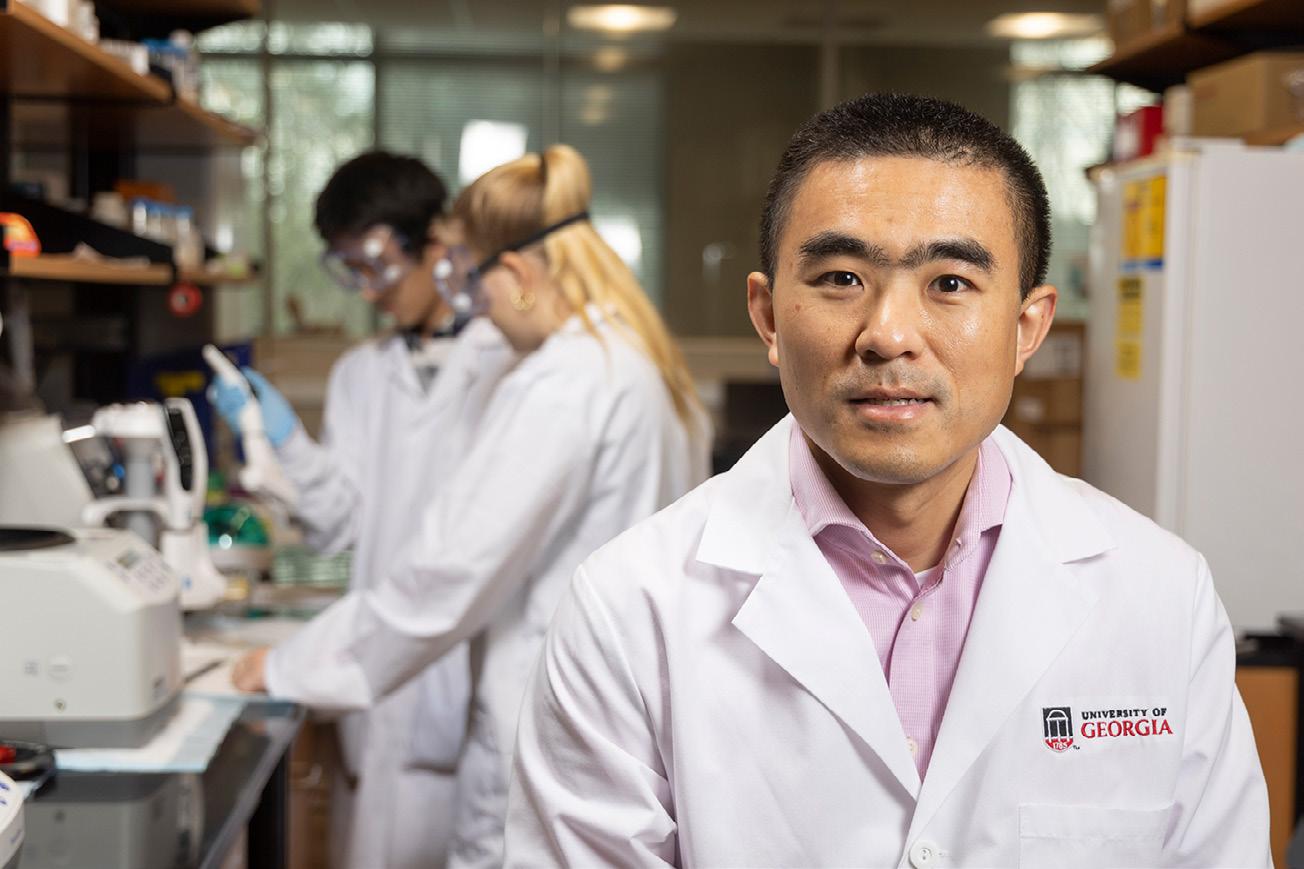
Fred C. Davison
Early Career Scholar Award
Fred C. Davison
Early Career Scholar Award
Michael F. Adams Early Career Scholar Award
has shown that caregivers and infants engage in more coordinated responses when vocalizations are relatively speech-like. He has identified a non-random structure to the clustering of vocalizations by infants as early as 11 days of age. Over the first two years, infants and caregivers become increasingly coordinated, providing the infrastructure for conversational turn-taking. By questioning assumptions about fundamental aspects of communication and trust, he offers ways to measure and explore the complex interactions of infants, toddlers and caregivers.
Pengpeng Bi, assistant professor in the Franklin College of Arts and Sciences’ genetics department and Center for Molecular Medicine, has contributed to understanding the molecular mechanisms of muscle development and regeneration. His role in discovering, characterizing and naming the protein Myomixer was a substantial advance. Muscle growth and repair depend on the fusion of smaller muscle cells. Bi identified the protein Myomixer as a switch for human muscle cell fusion. His group used a suite of model and non-model organisms to investigate the origin of muscle cell fusion, shedding light on a deep mystery of vertebrate evolution. His group is spearheading the development of a CRISPR toolkit to create genetically engineered mouse models and identify new genes essential for muscle development. These works have been published and constitute a resource for all investigators who employ mouse models, including those outside the muscle biology field.
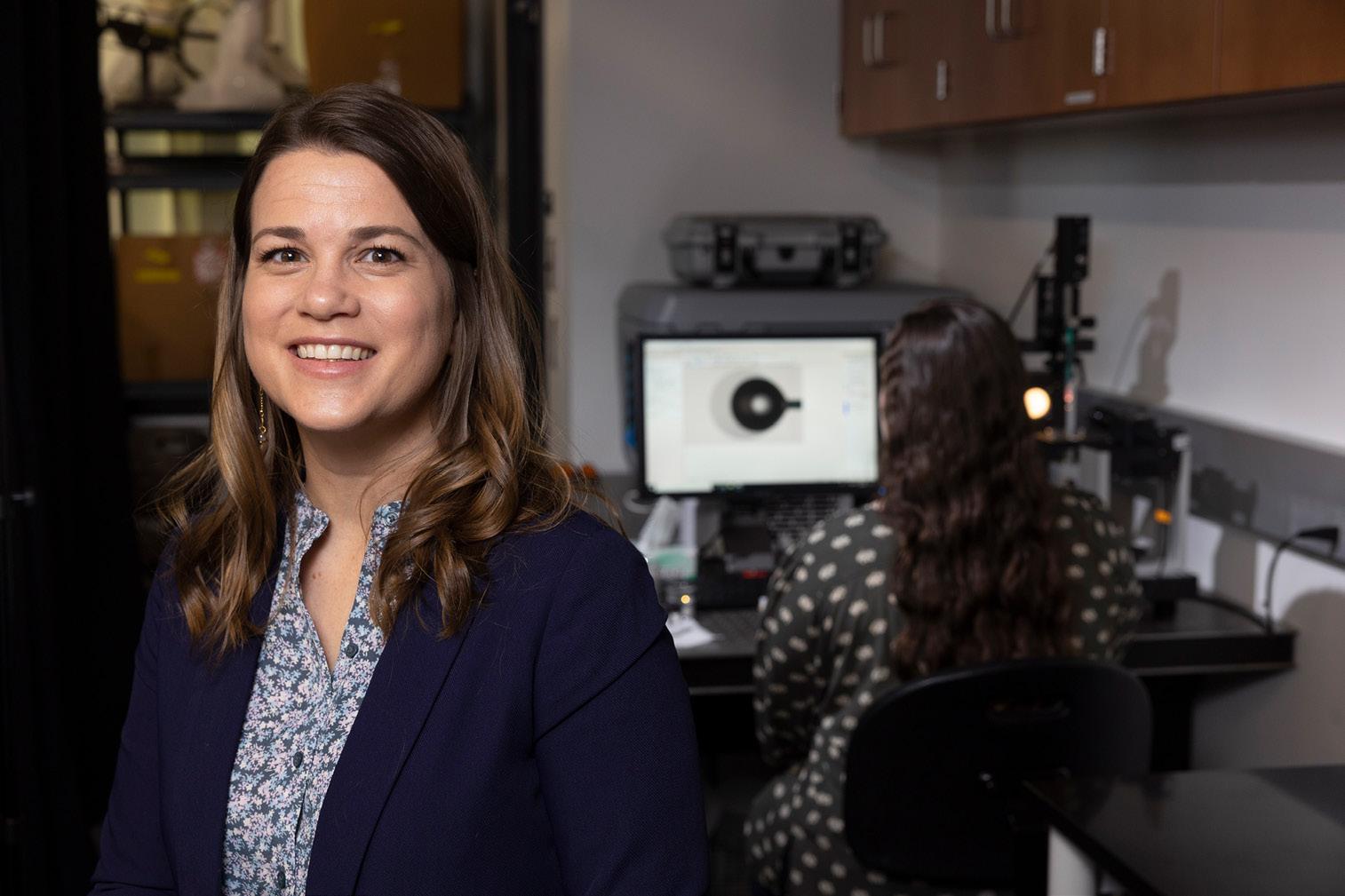
Amanda Frossard, assistant professor in the Franklin College of Arts and Sciences’ chemistry department, has developed new techniques to study the ocean surface and marine aerosol production through a combination of field and laboratory studies. She has built a reputation as an expert in ocean surfactants—chemicals that reduce surface tension—and their transfer to sea spray aerosol. Her group developed analytical methods for surfactant characterization in aerosol particles and seawater. Frossard designed and fabricated an aerosol optical trap instrument to study single-particle absorption of water, and she has undertaken six field studies for sample collection, including multiple research cruises. She received a five-year National Science Foundation CAREER grant award, reflecting that her work is reshaping long-held conventional views of the cycling of particulate organic matter in marine air.
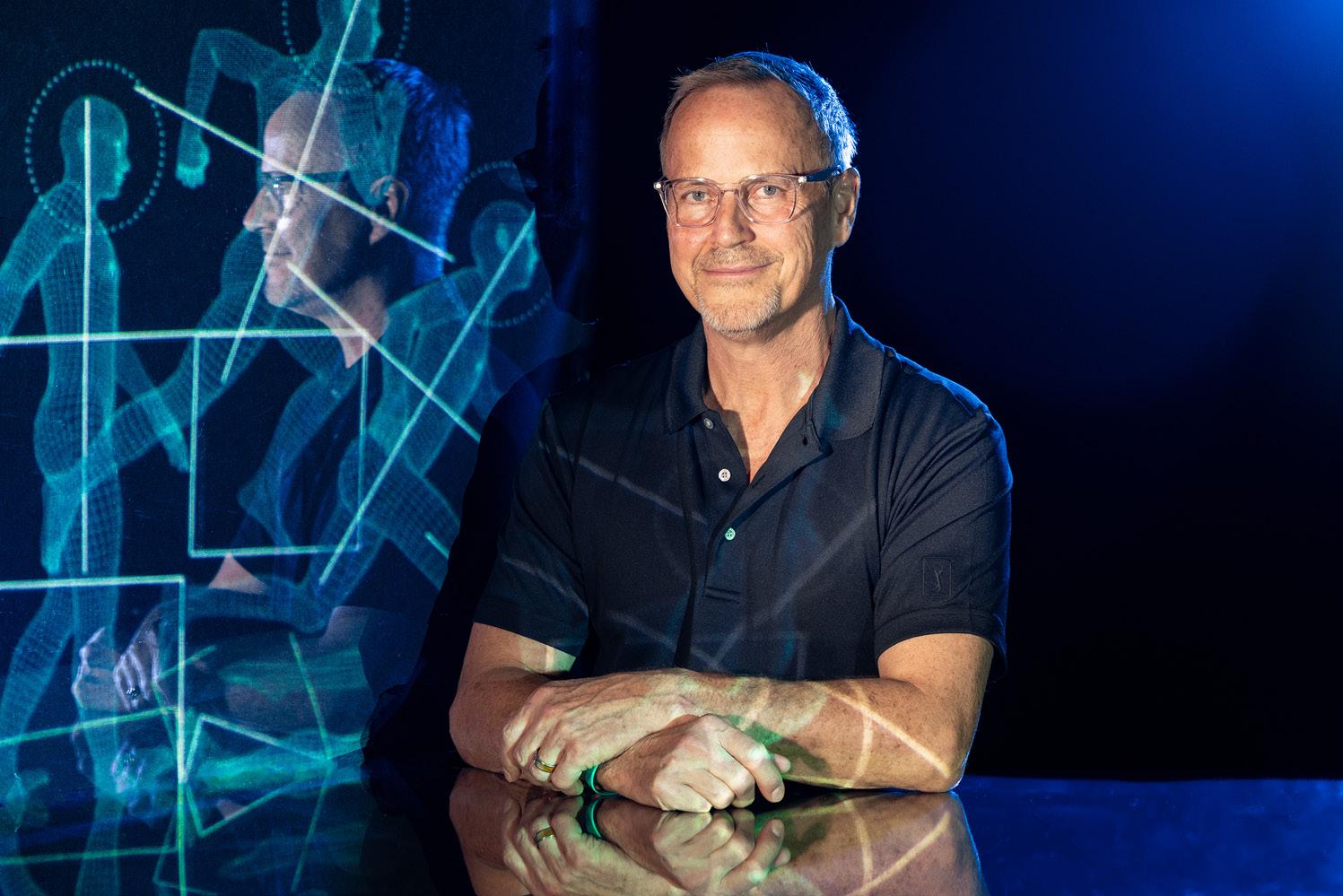
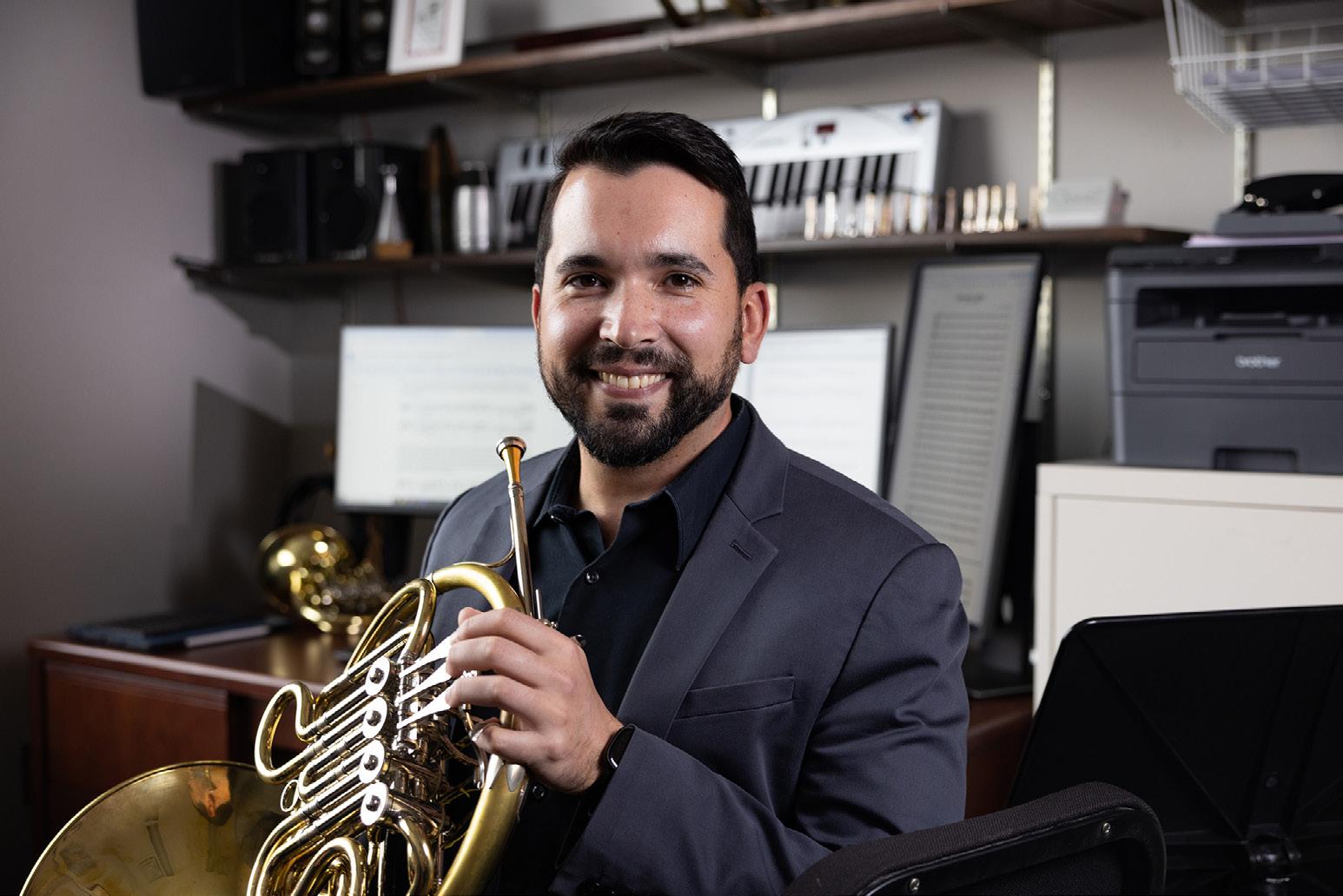
James Naigus, assistant professor of horn at the Hugh Hodgson School of Music, seeks to inspire the next generation of musicians and creative thinkers through artistic empowerment and enthusiastic innovation. He continues to impress the international music community as a performer and a prolific composer, with a catalog of more than 80 published works. Naigus’ compositions are performed around the world, providing challenging repertoire for players and engaging experiences for the audience, with more than 350 performances of his works over the past five years by distinguished musicians at venues of note, including the New York Philharmonic Orchestra, widely considered the most prestigious in the United States. His music is audibly appealing and virtuosic while approachable to musicians of varied abilities. Naigus is sought after as a clinician and guest artist/educator at universities and music conferences.
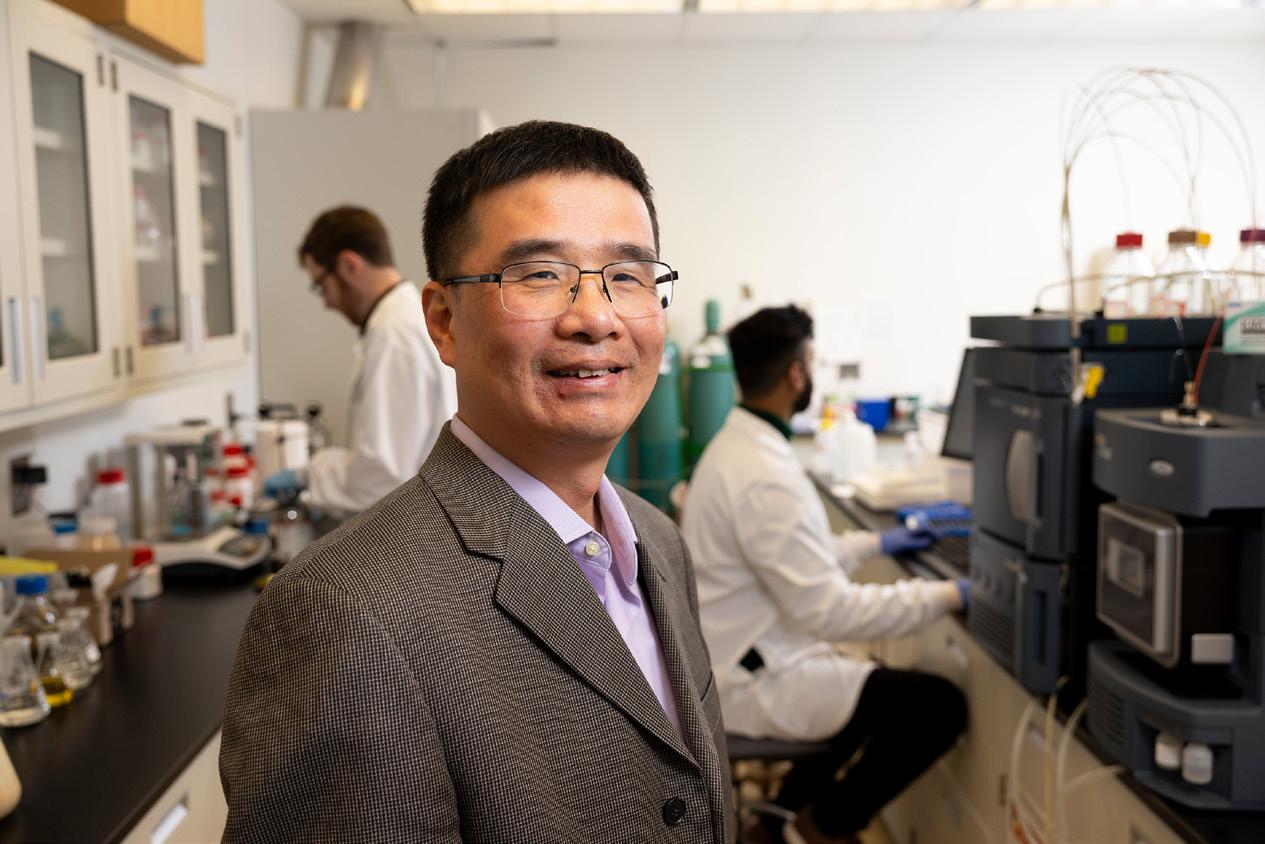
Qingguo (Jack) , professor in the College of Agricultural and Environmental Sciences’ crop and soil sciences department, studies environmental catalysis and its ap plications in soil re mediation, wastewater treatment and resource reuse. He developed an electrochemical pro cess to degrade PFAS (per- and poly-fluoroalkyl substances, also known as “forever chemicals”) that are widely present in water resources from longstanding use in both manufacturing and as ingredients in numerous products. The global engineer ing consulting firm AECOM has licensed the technology and markets it as the DE-FLUORO system in Australia, Europe and the U.S. as a means of destroying PFAS in water streams.
Lydia Aletraris associate research sci entist in the School of Social Work, has made remarkable contribu tions to research inno vation in social science and human trafficking. She is coordinator of the Prevalence Reduc tion Innovation Forum within the Center on Human Trafficking Research & Outreach. This U.S. Department of State-funded initiative aims to improve the science of human trafficking estimation.Aletraris’ leadership skills are instrumental in provid ing direction to the international PRIF teams that implement trafficking prevalence studies in six countries. She plays a vital role in developing standardized statistical trafficking indicators and definitions for researchers to use in prevalence estimation of populations that are hidden and hard to measure.
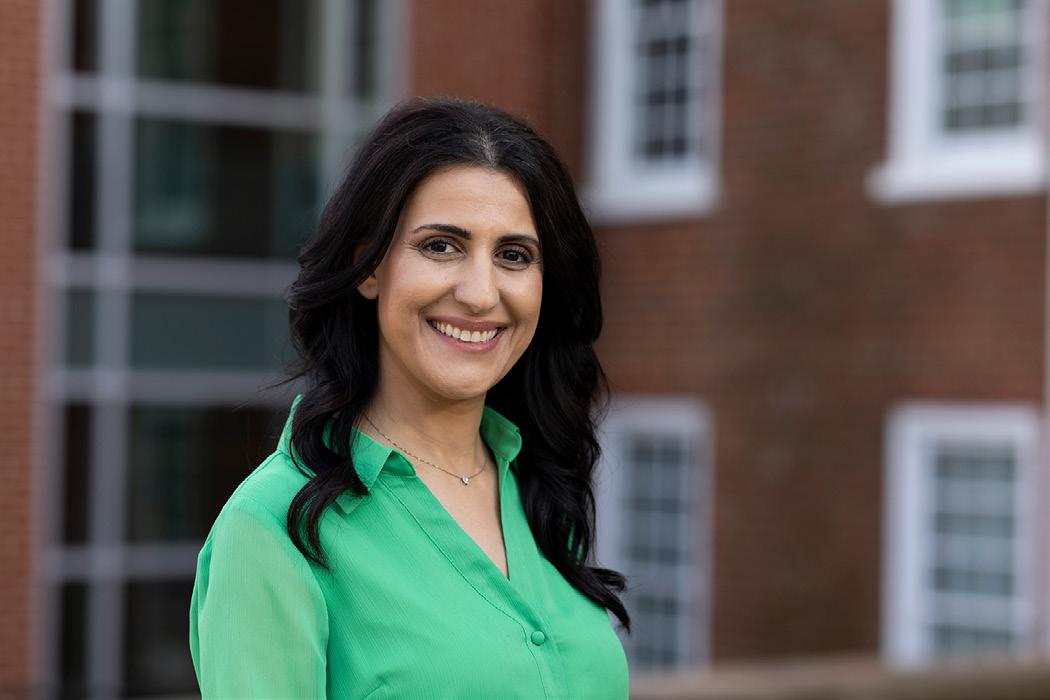
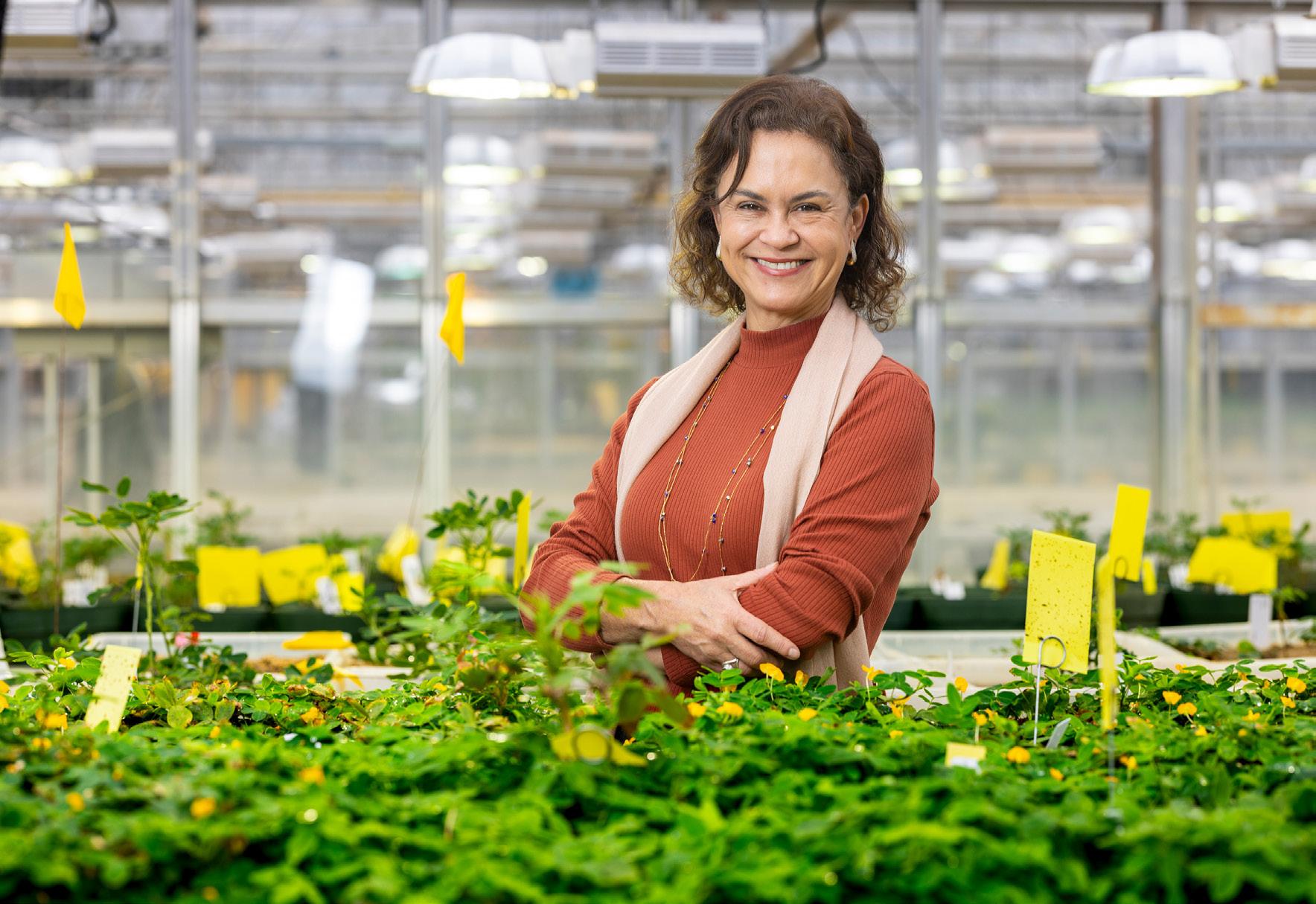
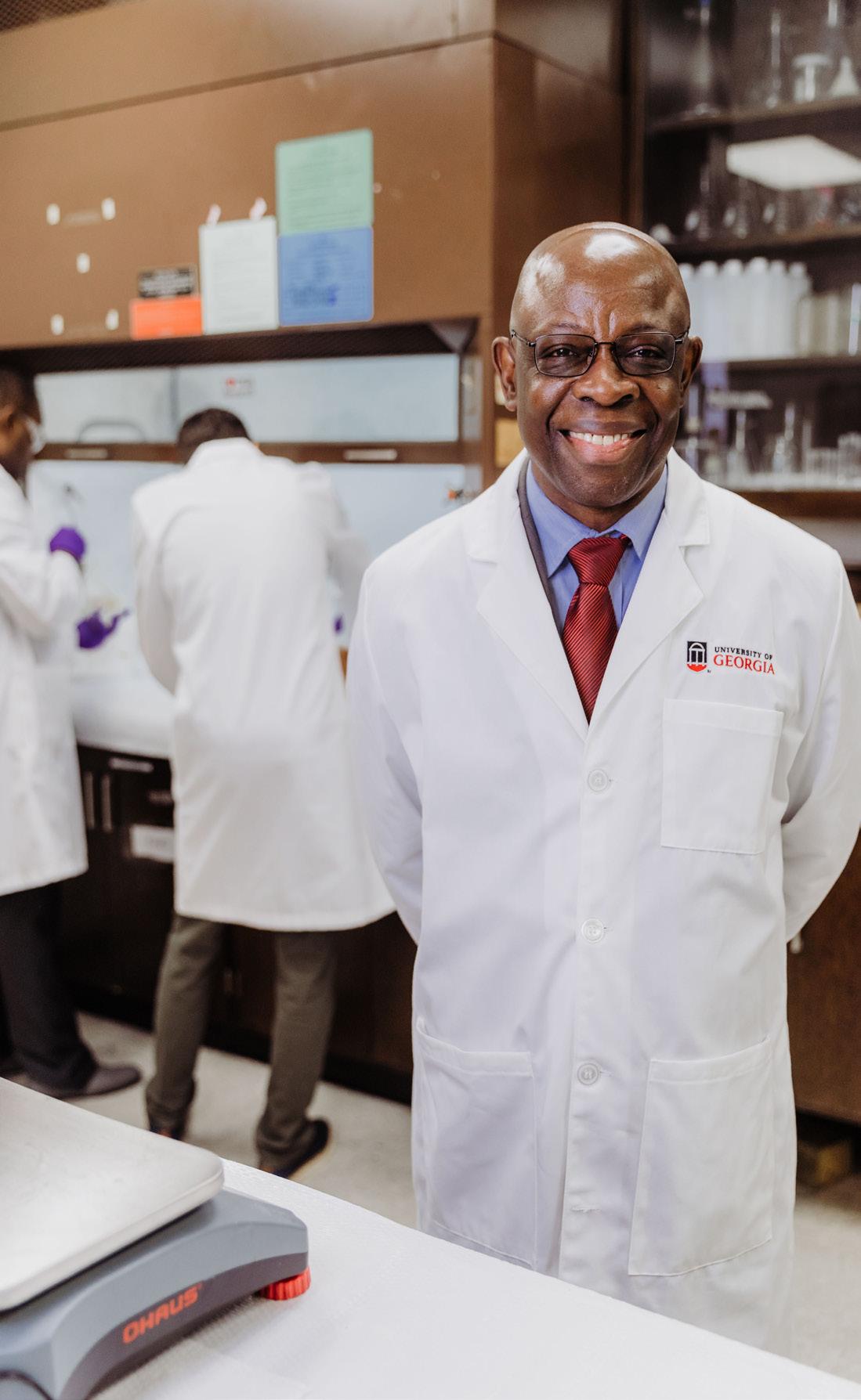
Turkey Doc.” He has developed a research program focusing on this popular game bird while disseminating his findings to audiences. Managing wild turkey populations under intensifying pressure from land-use changes and natural predators requires clear communications with conservationists and more than 2.5 million hunters na tionwide. Chamberlain’s website, wildturkeylab.com, launched in 2022, provides content to those interested in wild turkeys.
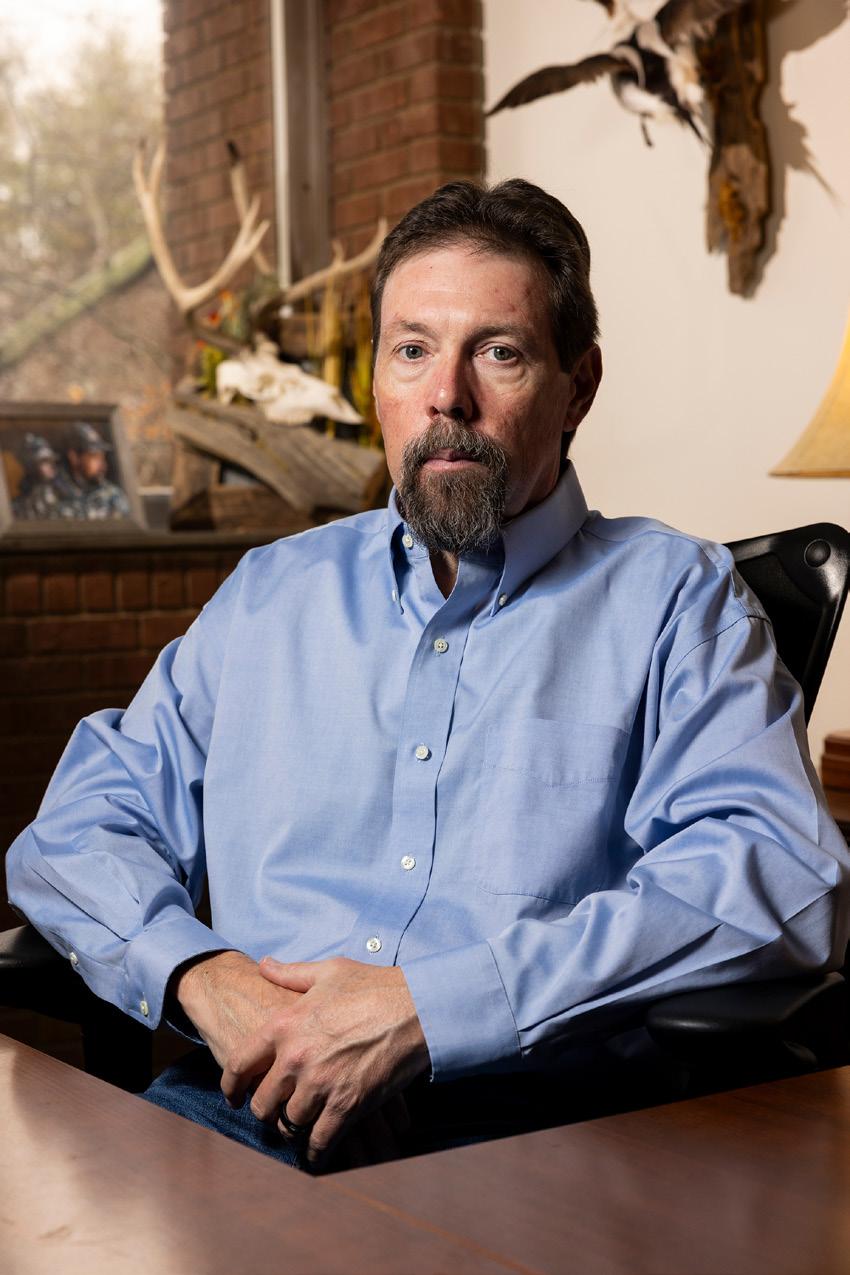
Comparable to a distinguished professorship, the Walter Barnard Hill Fellow Award for Distinguished Achievement in Public Service and Outreach is UGA’s highest award in public service and outreach.
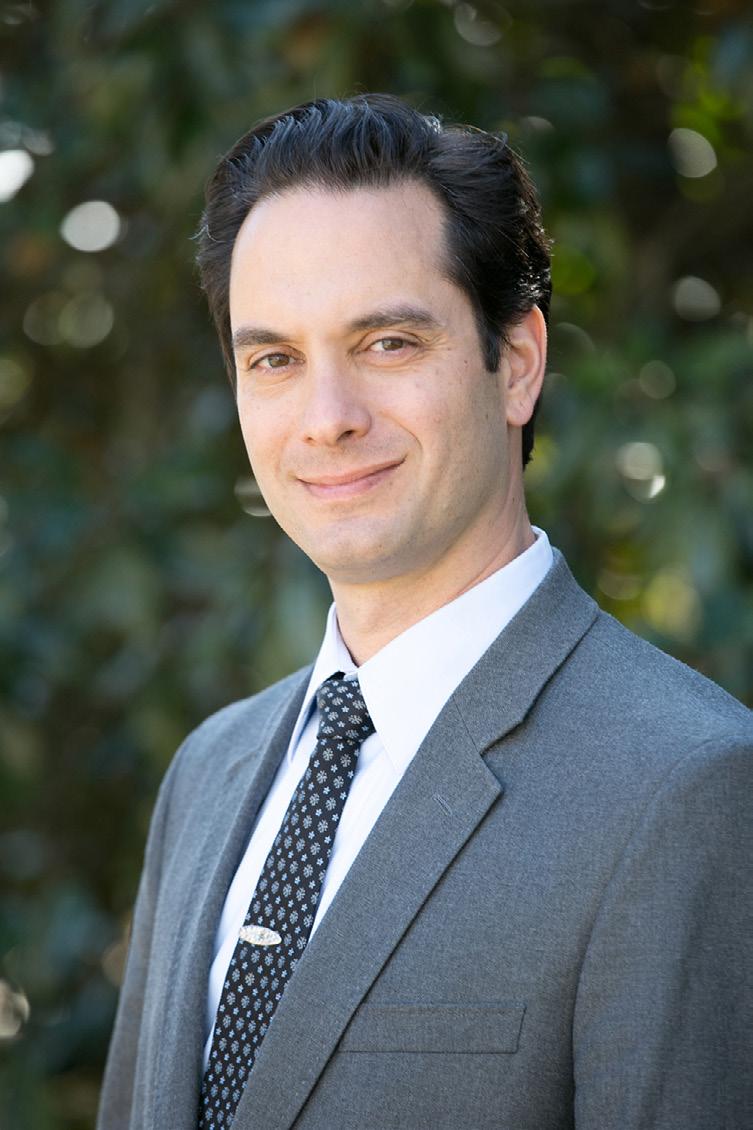
Danny Bivins is a senior public service associate with the Carl Vinson Institute of Government who focuses on partnerships that increase the economic development potential of communities and the state while providing valuable experiential learning opportunities to students.
Since 2013, Bivins has directed the Georgia Downtown Renaissance Partnership, a statewide downtown revitalization program that addresses design and economic development, drawing on the expertise of public and private organizations and foundations to bring their collective expertise to bear on community needs.
The premier component of the program is the Renaissance Strategic Visioning and Planning (RSVP) Process, through which the institute works with a community to develop its vision for the future and steps for implementation. Since 2013, the institute has worked
with communities to develop 25 RSVPs, with implemented plans resulting in more than $220 million of construction, revitalization and other improvements.
Bivins was a key partner in developing the Georgia Economic Placemaking Collaborative, which focuses on a community’s desirability as a place to live to attract multigenerational talent. Communities receive education, facilitation, technical assistance, peer learning and incentives to identify their assets and develop a locally based placemaking strategy. Fifteen Georgia cities and counties have been selected so far.
Bivins has created a unique community and economic development approach that uses visual communication to inspire downtown development, engage local and state leadership, and stimulate private and philanthropic investment. Bivins’ programs include experiential learning opportunities for undergraduate and graduate students. In collaboration with three College of Environment and Design faculty members, he has co-led eight studio courses with 111 students in six Georgia communities.
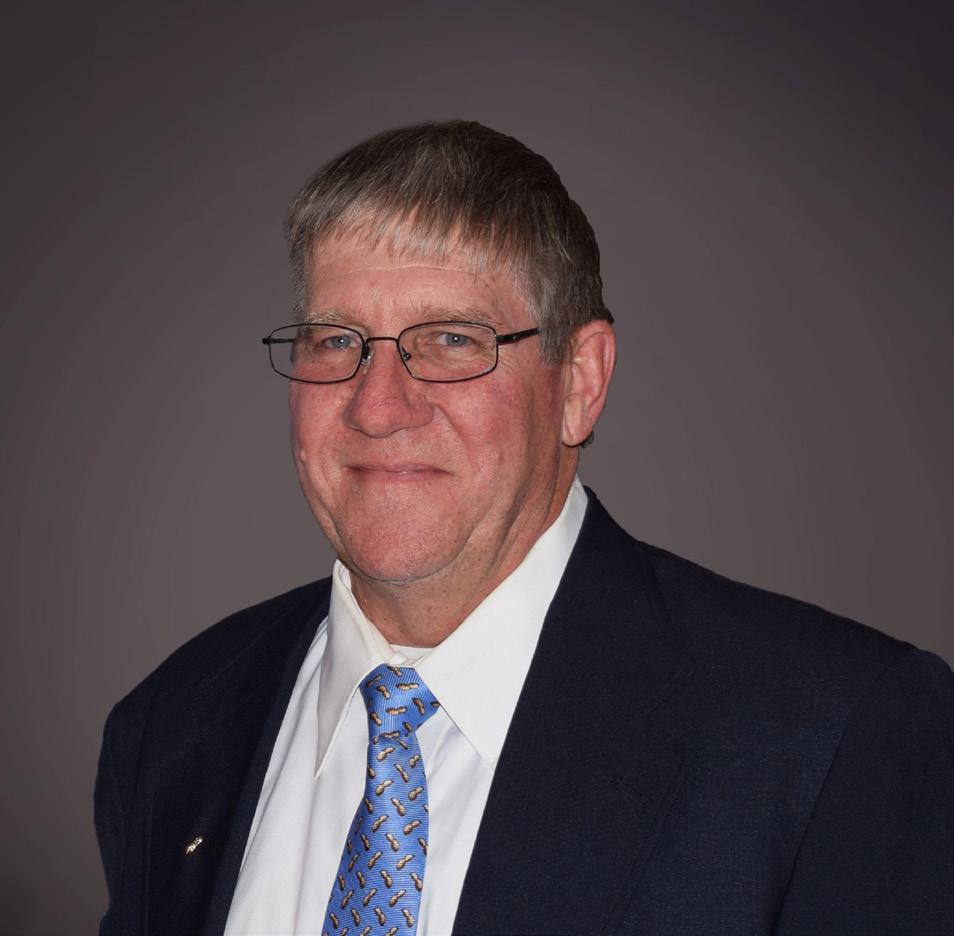
water agent and a senior public service associ ate for UGA Extension. He served as county extension coordinator in Irwin County for 18 years, overseeing the county program’s administration, including budget, funds development, needs assessment, adherence to policy and employee oversight.
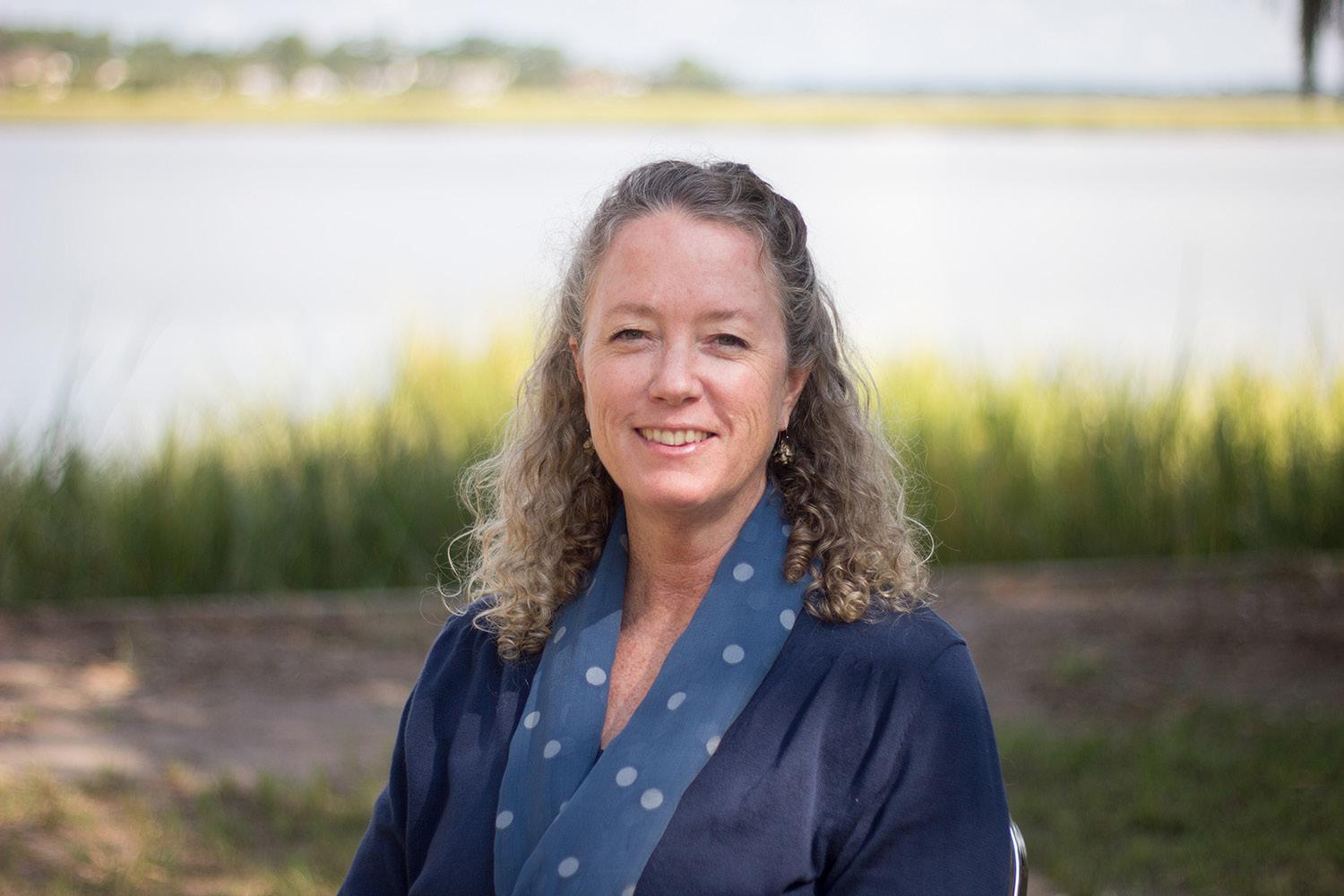
Four faculty members and service professionals are 2023-24 recipients of the Walter Barnard Hill Award for Distinguished Achievement in Public Service and Outreach. The award recognizes their contributions to the improvement of the quality of life in Georgia and beyond.
Anne Lindsay is associate director of marine education and senior public service associate at UGA Marine Extension and Georgia Sea Grant. She teaches marine science and coastal ecology for pre-K through adult audiences and oversees the UGA Marine Education Center and Aquarium on Skidway Island near Savannah.
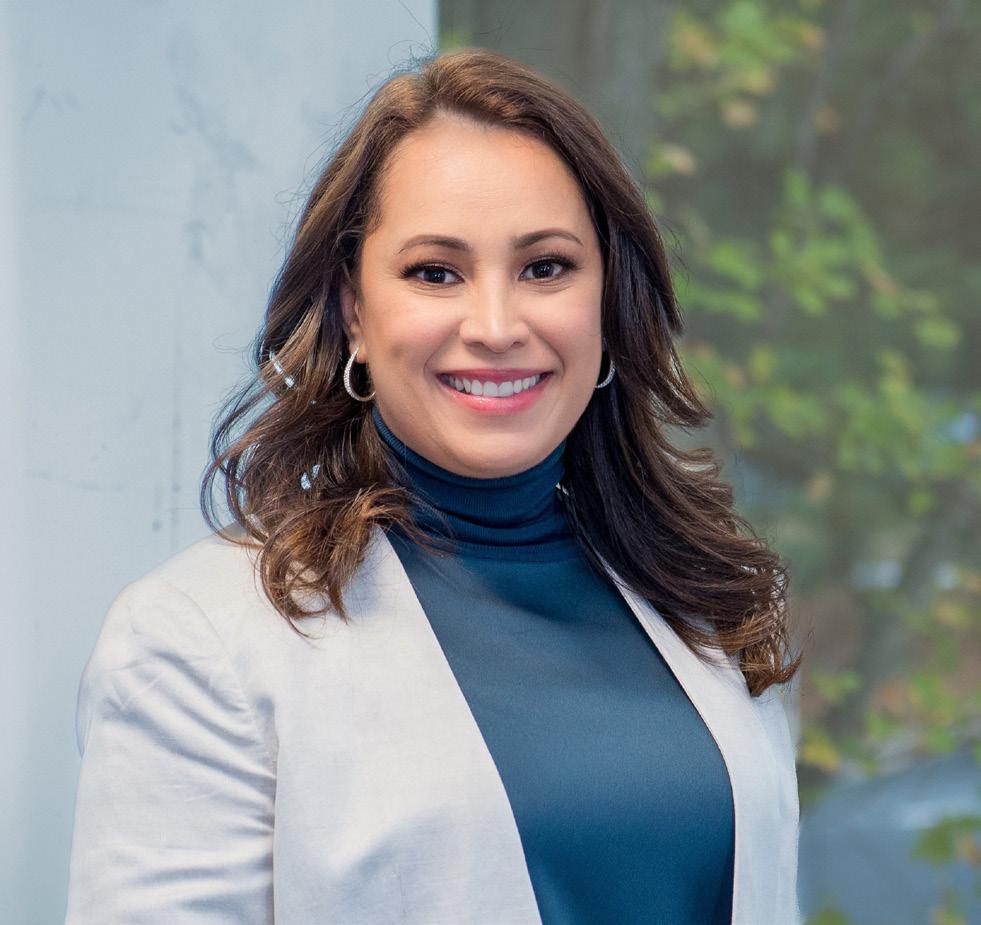
For 36 years, Edwards has called Irwin County home, and his work addresses the needs of the farm clientele there.
Edwards has conducted 147 applied research trials since 1998, most of them focused on cotton, to which more county land is devoted annually than any other commodity. Growers count on him at critical points in the growing season, from planting to defoliation. He coordinates multiple cotton-related county meetings that bring updated information to farmers, who use the information each year as they progress through the growing season.
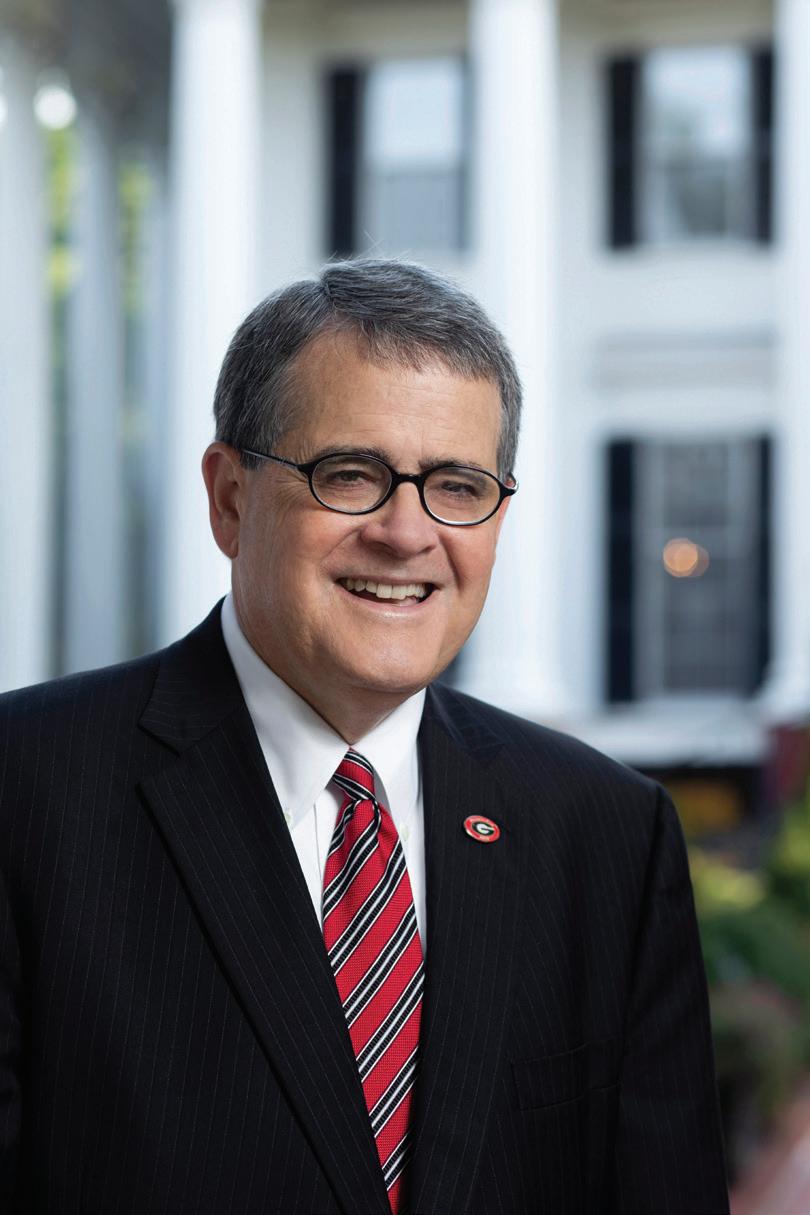
The focus of her work is to provide opportunities for students of all ages and backgrounds to connect with the natural world, engage in current coastal science and develop as stewards of the Georgia coast. She has implemented new programs, engaged diverse audiences, hired talented faculty and staff, and secured new funding. She has significantly enhanced the center’s interpretive capacity with new exhibits and educational elements, as well as new outdoor teaching spaces and buildings. Under her leadership, the center has seen a significant increase in school groups and general visitors.
Carolina Ramon is director of specialty programs for the UGA Small Business Development Center. In this role, she manages the SBDC’s International Trade Center, Multicultural Business Division and the state Small Business Credit Initiative across Georgia. Prior to this, she was the first Latina woman to be director of the SBDC Office of Minority Business Development, a position she held from 2017 until moving into her current job in 2021.
Since 2015, she has helped small business owners and disadvantaged groups understand complex government contracting programs.
She has provided more than 3,500 hours of business consulting related to government contracts to 460 Georgia business owners and has helped socially and economically disadvantaged business owners secure $148 million in contracts with federal and local governments.
“I am extremely proud of the remarkable accomplishments of our faculty, staff, students, alumni and friends. The University of Georgia is made stronger by each of these individuals and their commitment to excellence.”
—President Jere W. Morehead
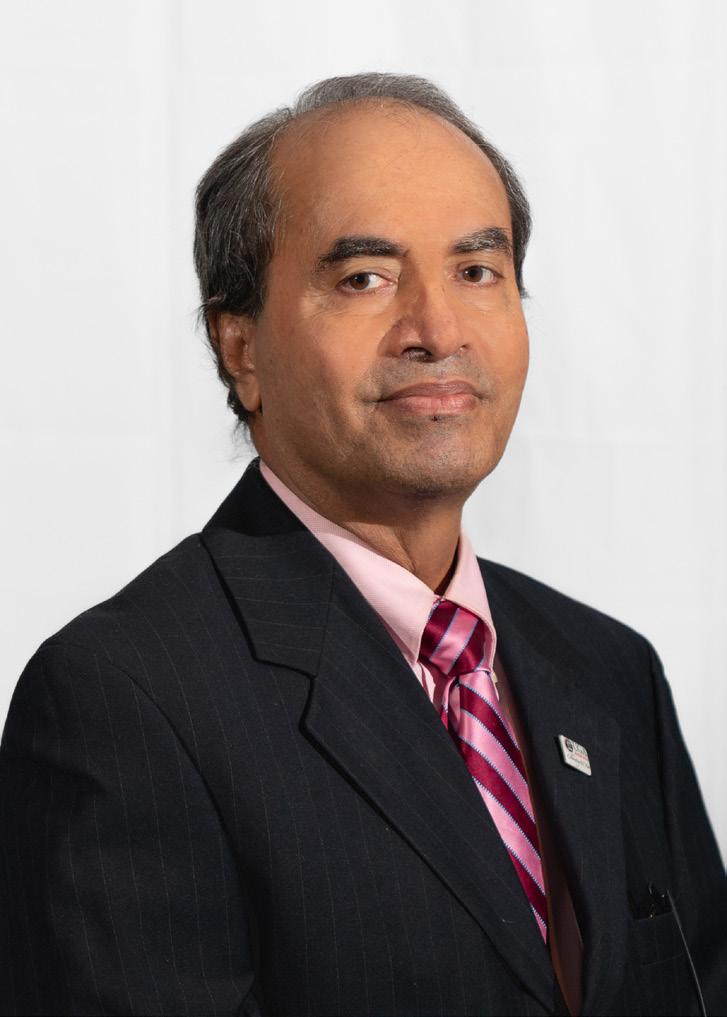
Uttam Kumar Saha is a senior public service associate and the program coordinator of the Feed and Environmental Water Laboratory for UGA Extension. In that role, he operates a lab with a collaborative team of UGA experts who test for and mitigate threats to air, water and feed/food.
In 2010, routine water testing by Saha and colleagues led to the discovery of uranium in some household wells in north Georgia and launched an aggressive program to monitor and address the threat. Radon, a radioactive gas causing lung cancer, exists in indoor air people breathe and is found in well waters often together with uranium. His team was awarded a Georgia State Indoor Radon Grant by the EPA in 2012, with awards totaling $2.5 million. Since 2012, the team has helped with mitigation of 3,000 homes for indoor air radon and 200 private wells for radon in water. They continuously update Georgia’s indoor air and well-water radon map.
Three UGA faculty members received a Russell Award for Excellence in Undergraduate Teaching. Russell Awards recognize outstanding teaching by faculty early in their academic careers. Award recipients receive $10,000. The Richard B. Russell Foundation in Atlanta supports the program.
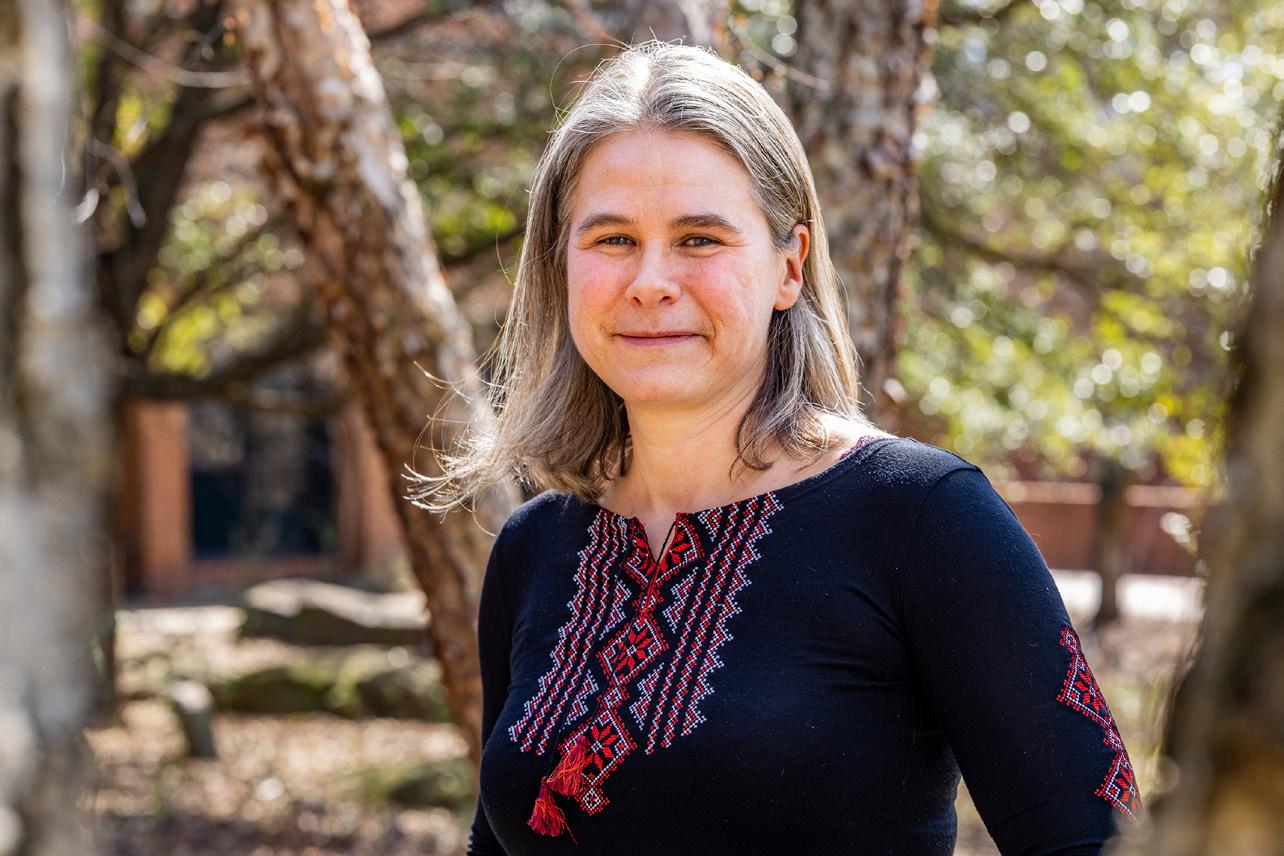
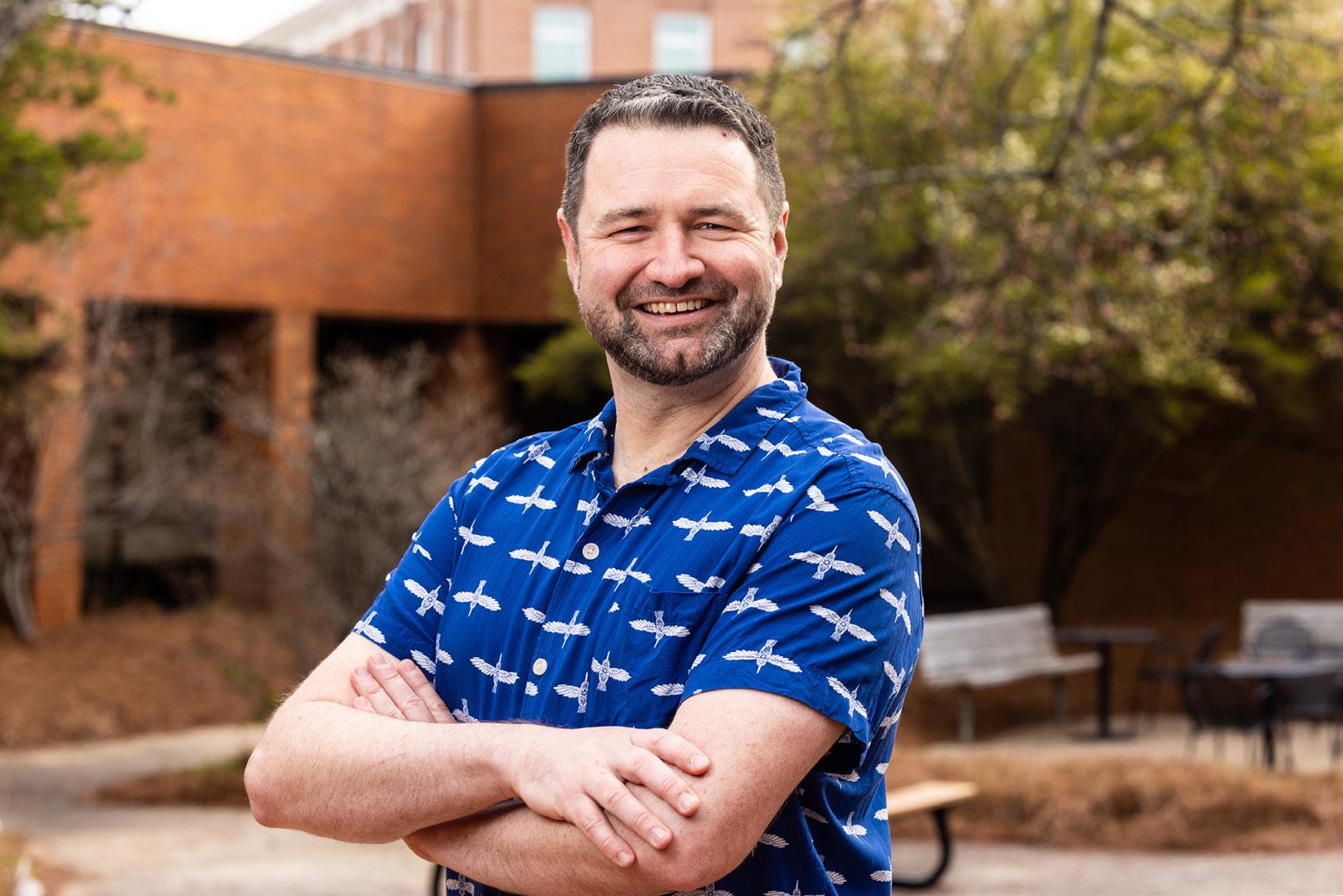
Jill Anderson strives to foster critical thinking and create an inclusive and equitable environment in which all students can thrive.
“In my courses, I combine lectures, discussions and handson exercises to engage students in activities such as designing experiments, formulating hypotheses, graphing predictions and interpreting results,” she said. “I incorporate active and inquiry-based learning techniques into all levels of education to engage students, challenge their misconceptions, and encourage questions, analysis and synthesis.”
Although Anderson’s approach to each class might be different, she emphasizes that science is an inherently dynamic process in all of them. She co-teaches two courses: Evolutionary Ecology for undergraduates and Foundations in Evolutionary Genetics for graduate students.
In her undergraduate course, students learn that dynamic process by using available data to generate questions, test their hypotheses with available data, write reports and design future studies. These exercises challenge students to apply the concepts they’ve learned to the interpretation of authentic data and the design of follow-up studies.
“In my time spent with Dr. Anderson, she has always been truly passionate about evolutionary ecology, the wellbeing
Richard Hall seeks to engage his students with the amazing and diverse natural history that surrounds them.
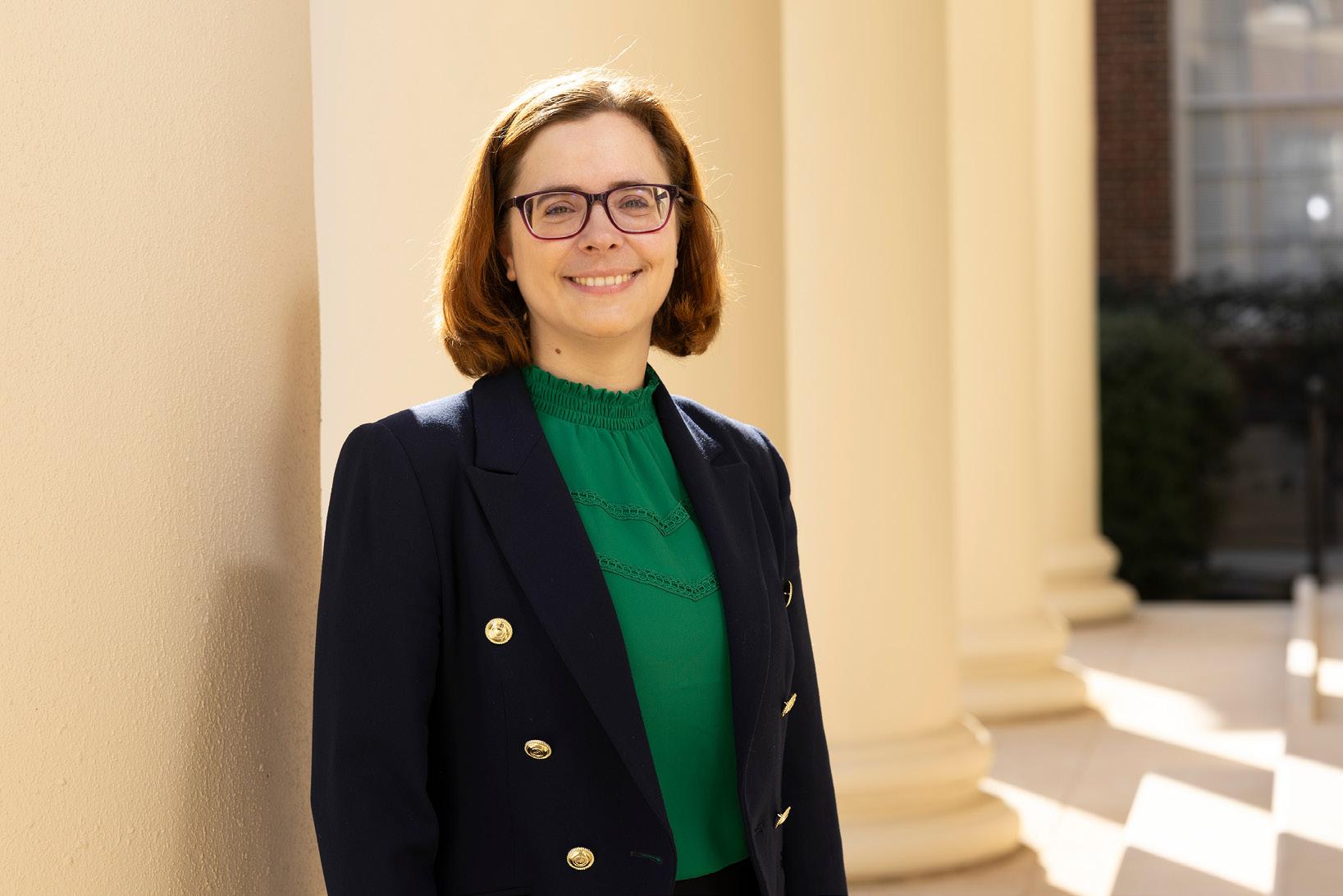
“My approach to teaching is very much shaped by my interdisciplinary academic background and my passion for the natural world,” he said. “I feel I am most effective as a teacher and mentor when I am able to interweave my research, teaching and service.”
Hall has co-developed and taught four undergraduate courses, in addition to teaching four graduate courses. In all of them, he accommodates diverse learning styles, applies mathematical theory to life sciences and uses active learning to build comprehension of abstract scientific concepts.
Mentoring is particularly important to Hall. He has advised two postdocs and seven graduate students and served on 24 graduate student committees. In addition, he has supervised 19 undergraduate students in their research.
“Dr. Hall’s curiosity, passion and excitement for the natural world undeniably shaped my career goals and aspirations, as I’m sure he has done for many others,” one former student wrote. “He has instilled in me a love of knowledge, taught me to critically think about the world I’m in, and shown me there are still many wonderful things left to uncover. However, more importantly, he was really showing me how to invest in
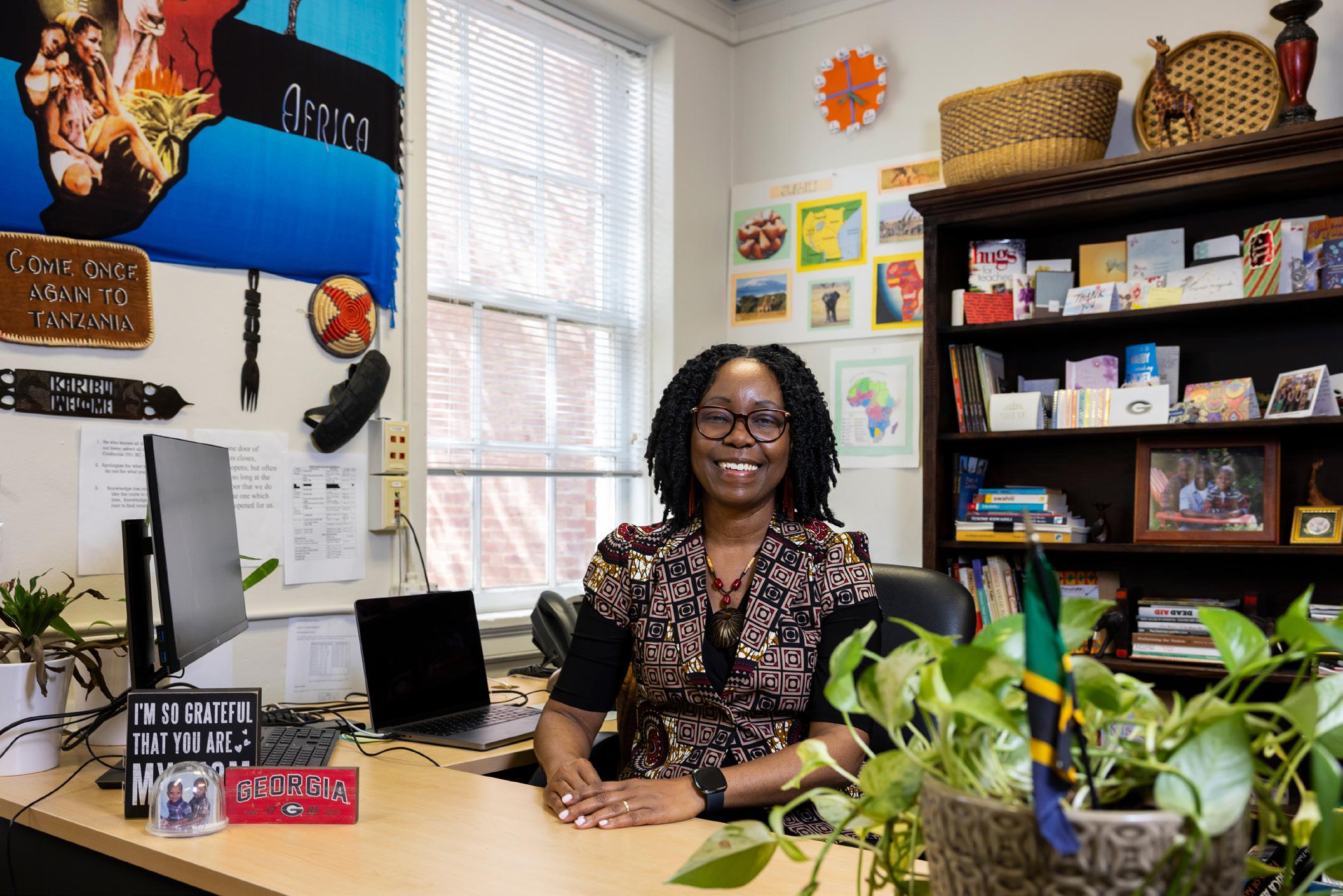
Laura Zimmermann centers her teaching and mentoring on three pillars.
She seeks to bring the world into the classroom through active learning and research exposure; empower students to follow their dream careers by preparing them for life after UGA; and ensure an environment of belonging in the classroom and beyond.
“Development economics and political economy are both highly dynamic fields where technical, conceptual, practical and ethical advancements are constantly made,” she said. “Traditional textbooks are therefore limited in their ability to give students a true sense of where the field of economic development is going. For that reason, I constantly innovate and adapt my course materials, both inside and outside the classroom, to bring the world into the classroom through active learning and research exposure.”
One example from her economics course has students take on the role of NGO workers in the aftermath of Haiti’s 2010 earthquake. They then compare their outcomes to real video footage and media reports.
Zimmermann has served as mentor of 65 economics undergraduate students for their senior theses and supervised
The University of Georgia Award for Excellence in Teaching recognizes exemplary instruction by teaching faculty at the University of Georgia. These teachers show strong commitment to UGA’s teaching mission, and the award recognizes the corps of teaching faculty that dedicate their time primarily to outstanding teaching endeavors, in and out of the classroom.
Department of Comparative Literature and Intercultural
sees teaching as a blessing.
she said. “I believe in the power of creating a positive learning environment whereby each and every student feels welcomed, acknowledged, valued and accepted.”
Maganda joined the Franklin College of Arts and Sciences’ comparative literature and intercultural studies department in 2012 and has taught Swahili language courses and related culture and literature courses since then. She employs several active learning techniques to tap into the knowledge students already have and build upon it.
and ideas she intends to impart. For example, she organizes out-of-classroom events to interact with students, making home-cooked authentic Swahili cuisine to allow them to taste the various foods of the Swahili while introducing them to cultural norms around the table.
“Dr. Maganda is amazing. She cares about all of her students, current and past students. I got so much more out of this course than I expected to,” one former student wrote. “The development and exploration of identity and culture are essential aspects for personal growth, reflection and development. Her class is relaxed and conducive to natural learning.” Chamberlain Smith
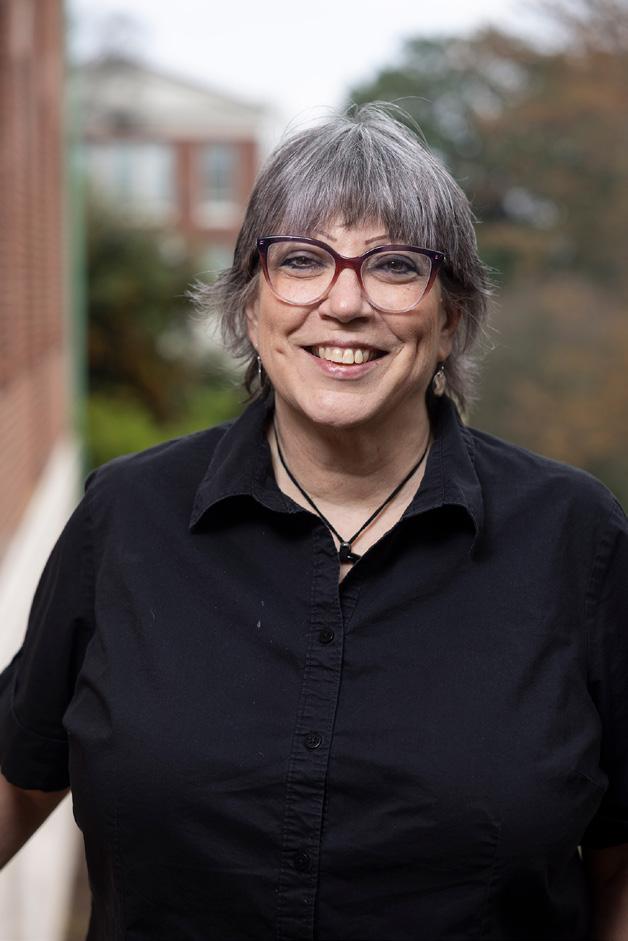
“I enter my classroom with an attitude of gratitude, in my heart, thanking my students for being interested in learning what I have to offer,”
Montgomery Wolf teaches with two tenets in mind—active learning for her students and ongoing learning, training and self-reflection for herself.
“From the first day, students see history not as rote memorization but as investigation and
Maganda seeks ways to ensure her students get firsthand cultural experiences of the concepts
interpretation. Students engage primary sources, generate their own questions and reach their own evidence-based conclusions,” she said. Wolf designs activities so that students are practitioners of history rather than passive recipients of content.
For example, she uses a modified flippedclassroom approach in a required class covering the history of the United States and Georgia. Rather than listening to lectures the entire period, students spend a portion of each class examining complex historical problems in a collaborative environment with activities like breaking into groups to tease apart the distinctions between
political parties in the 1790s and the present.
In several courses, Wolf structures her classroom as a zone of immersive role-playing, centered on key historical moments like the Constitutional Convention of 1787. Students adopt roles as historical actors who debate and negotiate with each other using historical evidence.
“Dr. Wolf makes the past accessible by linking major events to the lives of ordinary people. She invites students to glean their own lessons from complex historical conflicts. She attends to students with care, interest and compassion,” one former student wrote.
The Engaged Scholar Award recognizes a tenured associate or full professor who has made significant career-spanning contributions to the University of Georgia’s public service mission through scholarship, service-learning opportunities for students and campus leadership. The awardee receives a $5,000 faculty development grant to sustain current engaged scholar endeavors or to develop new ones.
Diane W. Bales is a UGA Extension human development specialist, Child Life Program director and professor of human development and family science in the College of Family and Con sumer Sciences. In these positions, she engages in diverse activities, including applied research, highimpact instruction and experiential and service-learning activities that advance the University of Georgia’s public service and outreach mission.
Two outstanding University of Georgia faculty members have been recognized by the Office of Service-Learning with Service-Learning Excellence Awards. These awards recognize faculty for impactful service-learning instruction and for advancing service-learning scholarship. Since 2011, over 30 UGA faculty have received these awards.
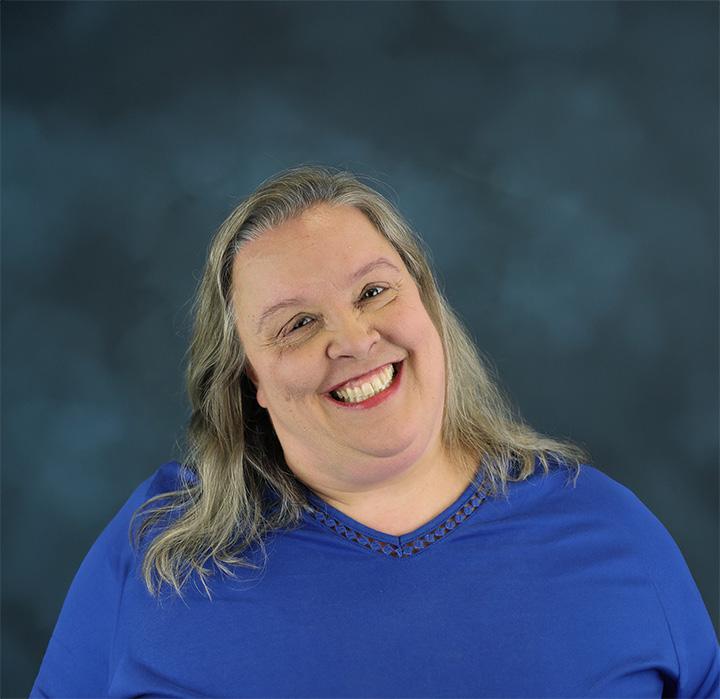
Since 1998, Bales has provided leadership and content expertise for the Better Brains for Babies initiative, a collaboration of public and private organizations dedicated to promoting the importance of early brain development in infants and young children. Bales has trained more than 700 educators in four states, including Georgia, about the importance of early brain development on children’s overall growth.
Her classes on child development include experiential, hands-on applications in class and in community-based service-learning projects.
As a primary investigator on a series of grants from the USDA Rural Health and Safety Education program on opioid awareness, Bales partnered with FACS Extension agents to conduct assessments in six Georgia communities with high opioid use and poverty rates. Based on responses to the assessments, Bales and UGA Extension are working with the communities to develop hubs for education and support around opioid misuse.
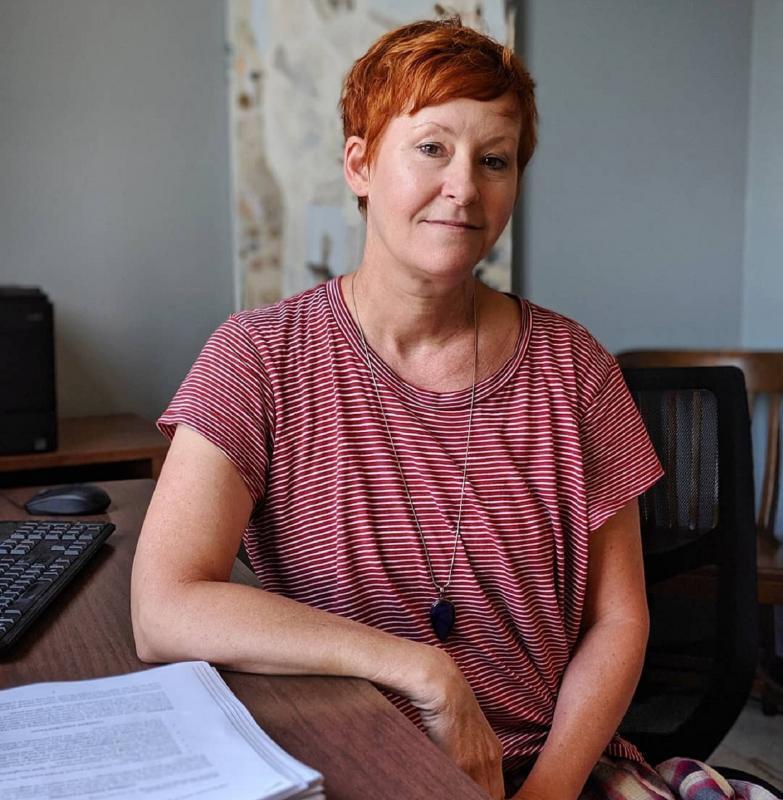
Caroline Young, lecturer with the English department in the Franklin College of Arts and Sciences, has evolved her English service-learning course, The Prison Writing Project, into a life-changing experience for her students. For this course, Young formed collaborations between the Georgia Museum of Art and Common Good Atlanta, a college-in-prison program that serves six prisons in Georgia, to connect the university with the incarcerated community and explore the role of the arts in prison education. Her students have completed projects to bring museum experiences to incarcerated students and helped bring the art exhibit curated by women in Whitworth Women’s Facility, “Art is a Form of Freedom,” to life. Her class has also collaborated with Time Out of Joint, an organization that employs former prisoners as teachers, to develop Shakespeare workshops for high school and college classrooms across the U.S.
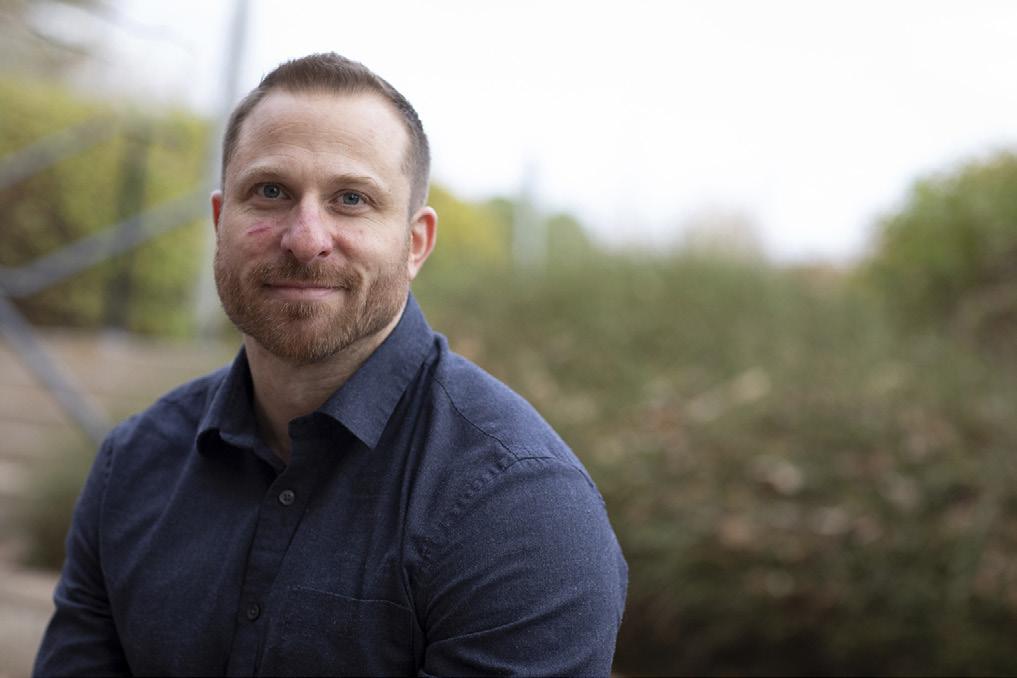
David L. Chiesa, clinical assistant professor with the Department of Language and Literacy Education in the Mary Frances Early College of Education, has inspired dozens of future educators with his course, English Speakers of Other Languages (ESOL) ServiceLearning. Chiesa’s students have the opportunity to tutor culturally and linguistically diverse students at Bay Creek Elementary School in Walton County and reflect on their growth as educators and professionals. With the growing population of ESOL learners in Georgia schools, Chiesa collaborates with Walton County educators to focus on the specific needs of elementary school students, providing UGA students with real-world experience in modifying and honing their lesson plans. Chiesa has taught this class every semester since spring 2020, and more than 100 UGA students have enrolled and tutored more than 225 Bay Creek students in that time.
The Creative Teaching Awards recognize UGA faculty for excellence in developing and implementing creative teaching methods to improve student learning. These awards are presented annually on behalf of the Office of Instruction to faculty who have demonstrated either the use of in learning beyond the traditional classroom or creative implementation of subject matter that has significantly improved student
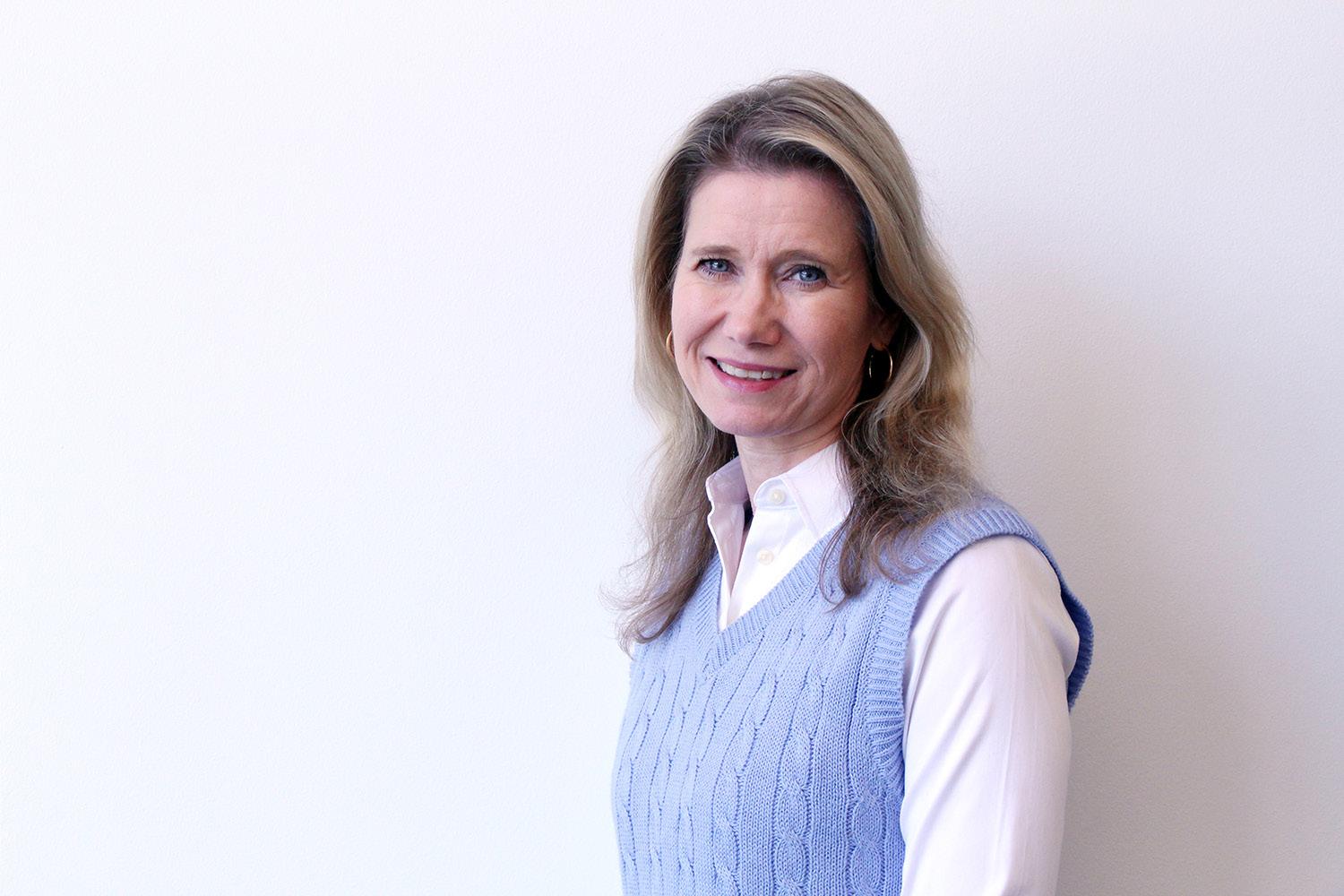
and rigorous course that prepares students for careers in journalism. Each semester, she teaches 180 students how to report, write, and edit and builds their journalism skills through active learning opportunities such as mock press conferences and beat pitch competitions judged by professional editors and reporters. In spring 2023, she created a Beat Bingo game/exercise that encourages students to meet people on their reporting beats, seek out resources in and outside the college, and connect with faculty and former students. Johnston has also built valuable common resources for her students, including a web portfolio template in cooperation with the Center for Teaching and Learning that students will use throughout their academic career as well as a free, fully online textbook. Johnston has even created her own YouTube channel, “Skills for Storytelling and Reporting.”
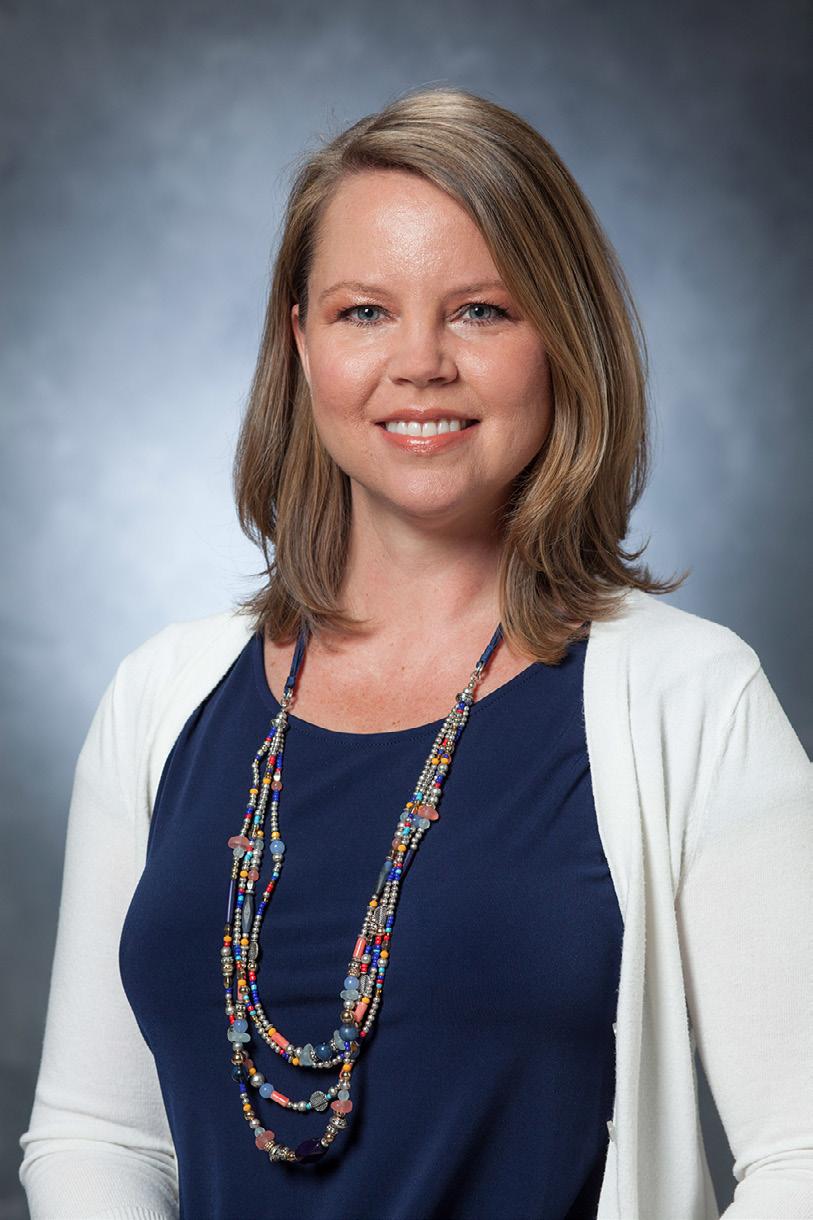
, a clinical professorences, is the creator and founding director of Destination Dawgs, UGA’s inclusive transition program for young adults with intellectual disabilities. She created Principles of PersonCentered Practices as a service-learning practicum class to teach undergraduate students about supporting people with disabilities. The course features online readings, videos, discussion, on-campus engagement, recorded journaling and the completion of a final reflection paper. Students volunteer a minimum of 30 hours as peer mentors, applying person-centered support practices to assist students in the Destination Dawgs program. Principles of Person-Centered Practices was intentionally created to promote active, experiential learning within the Disability Studies curriculum to improve critical thinking, problem-solving and professional communication. In end-of-course evaluations, students say they are proud of their role in the successes of their mentees.
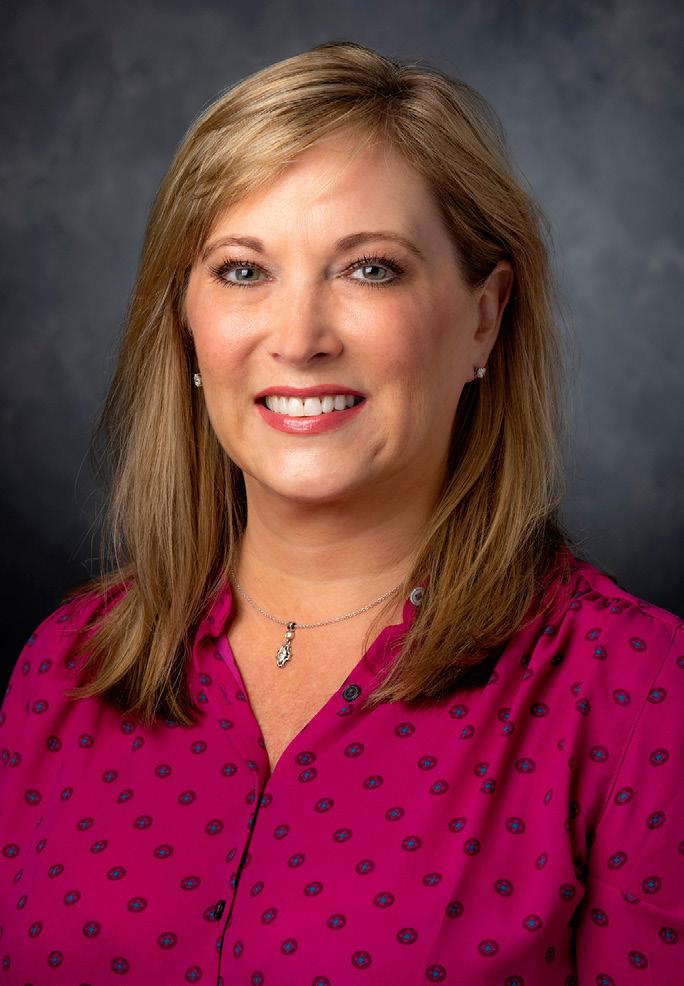
sociology in the Franklin College of Arts and Sciences, is transforming student hap piness. Through innovative use of technol ogy, she has designed a gamified simulation aimed at improving students’ engagement, application, and retention of material in her course, The Science of Happiness. The program focuses on life choices (e.g., use of leisure time, family arrangements, community characteristics) that students can make to improve well-being for themselves, their families and communities. The program produces a happiness score for each student, together with a breakdown of the relative impact of how their choices influence their score. Real-time feedback allows students to understand the results of their decisions and makes the learning experience interactive and fun. Survey data collected at the beginning and end of the semester indicated that students felt less depressed, overwhelmed, anxious and tense by the end of the course.
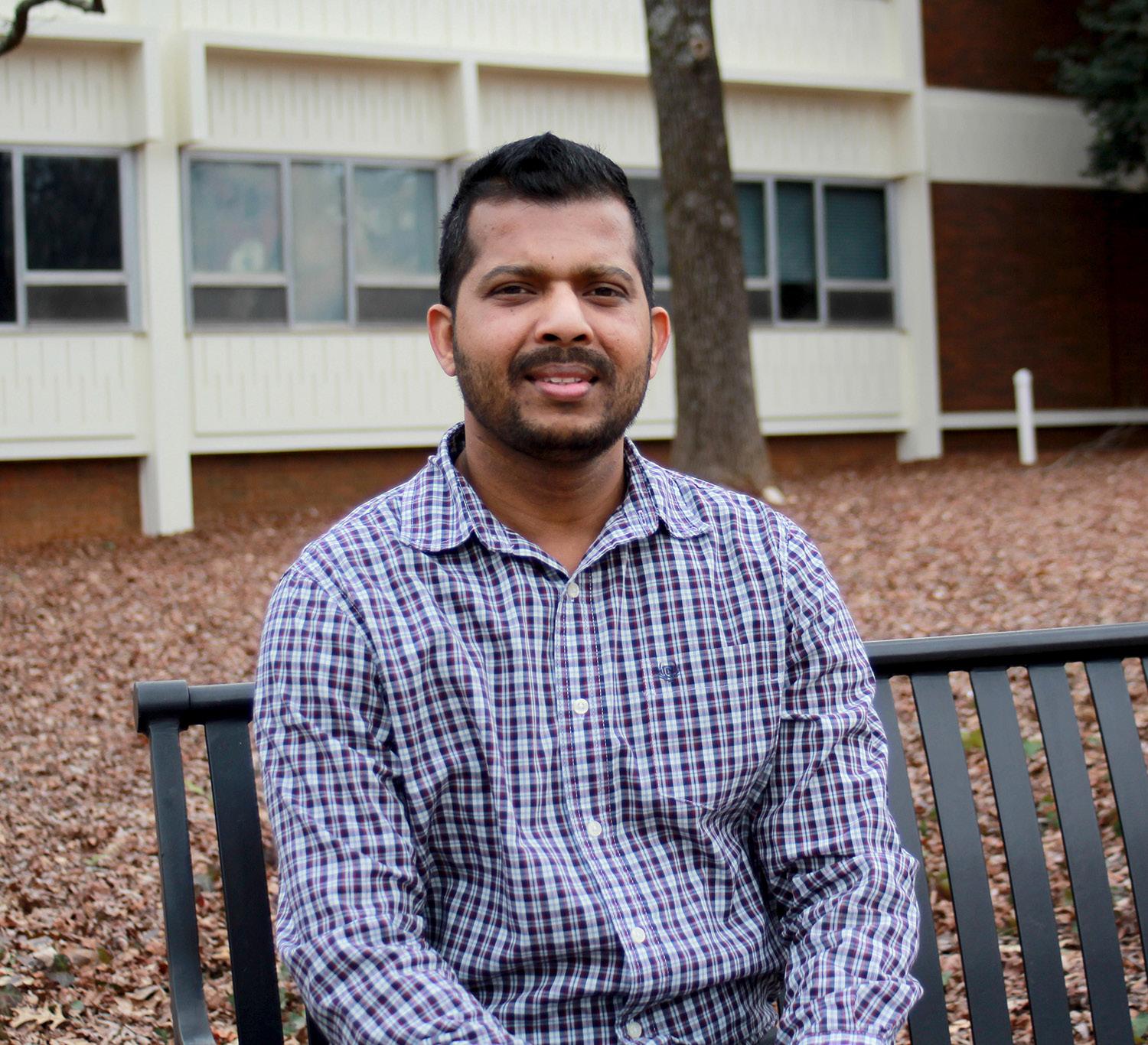
three-part method: prediction, experiment and data collecting. First, students engage with simulations to predict outcomes. Then, they perform laboratory experiments to test their hypotheses. Then, they have a recitation or problem-solving section to directly apply their acquired knowledge to original problems. The course focuses on hands-on skills and continuous improvement for each student. If students miss questions on midterm exams, they can record a video explaining their errors and correct solutions for partial credit. This deepens student understanding and helps students practice communication skills.
CAHNMANN-TAYLOR from page 1 April
learners, teachers and communities.
Cahnmann-Taylor uses several forms of technology in her teaching, including YouTube instructional videos to “meet” students each term in high-quality recorded lectures. She also has students engage in performances, exhibits and readings of their work.
“She gave incredibly fast and thorough feedback, for which I am extremely grateful. I have never seen such thorough or timely feedback from a university professor,” one former student wrote.
In addition to serving as LLED faculty, Cahnmann-Taylor also serves as affiliate faculty in art education in the Lamar Dodd School of Art, in Latin American and Caribbean Studies, and on the advisory board for the UGA Arts Collaborative.
CARPENTER from page 1
and her teaching,” one former student wrote.
Carpenter seeks to create an engaging and transformative learning environment for her students, finding unique ways to help them learn. For example, one assignment in her forensic accounting class asked students to find and present examples of fraud in the news to the class.
In 2022, Carpenter participated in the Active Learning Summer Institute, redesigning one of her courses with a fraud simulation case that she created with a UGA Learning Technologies Grant. Within this new simulation, students independently navigate the investigation by conducting live interviews with avatars, collecting evidence, analyzing data and building data analytics as they interface with the Artificial Intelligence technology
DOLAN from page 1
Committee and incorporates those techniques in her own teaching. She designs learning tasks for students to practice scientific thinking and gives them continuous feedback to help them improve. She uses case studies and problem-based learning so that students learn to work through real scientific issues and see the relevance of what they are learning to life outside of the classroom.
Dolan incorporates a distinct form of experiential learning—Course-based Undergraduate Research Experiences (CUREs). CUREs are designed to engage all students enrolled in a course in making authentic discoveries that matter outside of the classroom.
“Not only was she very well informed on the material taught, but she also made sure
SIMONS from page 1
She has participated in the Active Learning Summer Institute and looks for ways to increase student engagement and agency as well as their willingness to take risks. She makes frequent use of strategies like think-pair-share, peer teaching and minute papers. Simons is currently testing a gamified simulation in her Science of Happiness class, through which students will learn about building happier lives and communities.
“For Dr. Simons, teaching is a calling,” one former student wrote.
Simons is a member of the UGA Teaching Academy, has been selected as a Senior Teaching Fellow and Online Teaching
STANTON from page 1
monitor and evaluate their approaches to learning, as well as how they develop these metacognitive skills during college.
In addition, Stanton uses evidence-based approaches for instruction. For example, she integrates small-group work in her courses because it improves students’ learning, performance and collaboration skills while providing students with opportunities to build their knowledge and share their reasoning.
“An important aspect of Dr. Stanton’s interactions with students is how much she believes in and pushes them,” one former student wrote.
Stanton is a member of the UGA Teaching
Cahnmann-Taylor is a member of the UGA Teaching Academy and has also received the Center for Teaching and Learning Fellow Award, First-Year Odyssey Teaching Award and the UGA College of Education Research Sabbatical Award to author books on instruction.
Cahnmann-Taylor has authored or coauthored numerous books, book chapters and journal articles, including the forthcoming “The Creative Ethnographer’s Notebook.” She is currently on a translation team to bring the poems of China’s Labor Poet Laureate, Nianxi Chen, into the English language.
“Dr. Cahnmann-Taylor exhibits teaching excellence at the University of Georgia and around the world,” one colleague wrote.
platform. As a result, she was asked to join the UGA Faculty Advisory Board and the UGA Active Learning Advisory Committee.
Carpenter has been inducted into the UGA Teaching Academy, chosen as a Senior Teaching Fellow, honored as a UGA Fontaine Mentor, awarded a UGA Creative Teaching Award and selected as the inaugural Terry Instructional Innovation Fellow. Additionally, Carpenter was named a Lilly Teaching Fellow in 2005 and has twice served as a Lilly mentor.
“When I think of a faculty member who goes beyond the call of duty to educate, innovate, engage students inside and outside the classroom, inspire and encourage our students, Dr. Carpenter is top of mind,” one colleague wrote.
everyone understood what was going on and created a passion for biochemistry,” one former student wrote.
Dolan has mentored 82 undergraduates, supervised five doctoral students and trained 13 post-doctoral fellows. In her time at UGA, she’s authored or co-authored numerous publications. She has also received several grants, including some with the National Institutes of Health and the National Science Foundation.
“Over the years, Dr. Dolan has powerfully combined her experiences as a former research scientist, an active teacher and mentor, and a researcher of education and mentoring practices to become a thought leader who is sought out not just on campus but throughout the country,” one colleague wrote.
Fellow and received the Sandy Beaver Professorship from Franklin College. In 2019, she received the FYO Teaching Excellence Award, and in 2024 she received the Creative Teaching Award from UGA’s Office of Instruction.
She has co-authored a textbook and over 100 peer-reviewed articles and chapters. She has served as major professor for 9 doctoral students and 14 master’s students.
“Dr. Simons epitomizes UGA’s commitment to excellence in teaching through her extraordinary dedication to students, both inside and out of the classroom,” one colleague wrote.
Academy and has received the Russell Award for Excellence in Undergraduate Teaching. She has been selected as a Lilly Teaching Fellow and Center for Teaching and Learning Writing Fellow and earned a National Science Foundation CAREER Award and the Sandy Beaver Excellence in Teaching Award from Franklin College.
She has authored or co-authored numerous publications. Additionally, she’s received several research grants, including funds from the National Science Foundation.
“One of Julie’s most remarkable qualities is her dedication to refining the art of teaching and fostering positive interactions with her students,” one colleague wrote.
DOUGHERTY from page 1
understanding of the material with those who find it challenging.
Dougherty also uses active learning techniques. He begins his Game Theory course with “Twenty-One Flags.” He puts students into small groups and asks them to work out a good strategy for removing flags. The group that removes the last flag wins. This activity helps them understand why some players might play rationally and can then lead to a discussion of why others don’t.
“In every facet of his classes, Dr. Dougherty’s passion for educating and kindness
In a follow-up study, Jambeck and her team discovered that humans had generated 8.3 billion metric tons of plastic since the large-scale production of synthetic materials began in the early 1950s. Of that waste, the researchers found 79% wound up in landfills or in the environment.
A finding from Jambeck’s research was named the International Statistic of the Year in 2018 by the Royal Statistical Society. In that study, Jambeck and her colleagues found that more than 90% of plastic has never been recycled. The statistic lent a sense of scale to the problem of global plastic pollution.
authored or co-authored three books, one of which has also been translated into Croatian, and a number of articles and book chapters. He’s completed numerous conference presentations, papers and invited lectures.
He’s been awarded a nearly $450,000 grant from the National Science Foundation for the documentation and study of endangered language varieties spoken in northwestern Croatia, in addition to other grants and awards.
Langston also mentors students in their
faculty governance to pass two key policy pieces pertaining to teaching evaluation. According to Lemons, these policies serve UGA by broadening and clarifying the type of evidence that can be used to document teaching effectiveness, improving the quality of judgments made about teaching, and ensuring that the university sustains an inclusive work and learning environment.
One innovative program Lemons notes is the establishment of the Biology Education Research Interdisciplinary Group. This group is unique in that it includes faculty who conduct education research and faculty who conduct
ANDERSON from page 6
of her students, and operating to the highest standard,” one former student wrote.
Anderson has authored 61 peer-reviewed publications and received more than $2 million in grant funding, including an NSF CAREER grant. She’s also received the Sandy Beaver Excellence in Teaching Award.
HALL from page 6
others, inspire my students, and to show love and kindness to all those I work with.”
Hall has authored 62 peer-reviewed articles, co-edited a book on animal behavior and parasites, and authored five textbook chapters or encyclopedia entries. Additionally, Hall has served as a lead investigator or senior personnel on 11 research grants.
ZIMMERMANN from page 6
15 CURO research projects.
“Dr. Zimmermann remains one of my most important, impactful mentors to this day, and whenever I have reached out to discuss career plans, she has been just as attentive in giving advice as when I was a student,” one former student wrote.
toward students takes center stage,” one former student wrote.
A member of the UGA Teaching Academy, Dougherty also has received the Creative Teaching Award and the Lothar Tresp Outstanding Honors Professor Award and served as a Senior Teaching Fellow.
“Professor Dougherty is more than a great classroom teacher. He is a dynamic presence who has introduced undergraduates to the thrill of intellectual curiosity and critical thinking outside of the classroom in many ways,” one colleague wrote.
Jambeck also co-developed the Marine Debris Tracker mobile app with fellow UGA engineering associate professor Kyle Johnsen. The mobile app, created in partnership with the National Oceanic and Atmospheric Administration (NOAA), provides a platform for community members to log the types and quantities of plastic debris in their communities to help inform research efforts.
In 2022, Jambeck was awarded a coveted “Genius Grant” from the John D. and Catherine T. MacArthur Foundation. Jambeck was the second UGA faculty member to receive that award.
own research. He has supervised or cosupervised four Ph.D. dissertations and two M.A. theses and has served on 26 Ph.D. and 38 M.A. committees.
In the classroom, Langston continues to innovate. He calls himself “an early adopter of instructional technology” and was selected to participate in the inaugural cohort of the Center for Teaching and Learning’s Instructional Technology Leadership Program in 2000. Since then, he regularly redesigns courses with active learning in mind.
traditional bench- or field-based research. Graduate students in the group then have the opportunity to conduct both types of research with faculty members.
Lemons also continues to innovate in her teaching. For example, she was among the first to adopt peer learning assistants in her introductory biochemistry course. PLAs are students who successfully complete the course and then return the following semester to assist the case-based, small-group learning of their peers. Now, PLAs are widespread at UGA through the Division of Academic Enhancement and the Active Learning Initiative.
“Jill is a highly skilled and responsive instructor who engages students in challenging work in evolutionary biology within a welcoming environment. She treats teaching as a valuable scholarly endeavor and is continually striving to improve her teaching to benefit students,” one colleague wrote.
“Dr. Hall successfully provides students with rigorous training in conservation and in mathematical approaches to ecological theory in a clear and accessible way. He then challenges students to apply this knowledge to real-world problems through active learning and projectbased service-learning that benefits the Athens community,” one colleague wrote.
Additionally, Zimmermann has received the Terry College of Business Outstanding Teacher Award and participated in the University of Georgia Teaching Academy Fellows Program.
“It is difficult to put a value on a student making the connection between their undergraduate studies and the ‘real world,’ but I think everyone can agree that it’s significant. Dr. Zimmermann focuses on ensuring that all her students make that connection,” one colleague wrote.